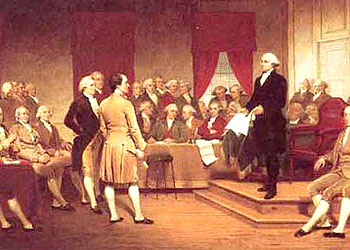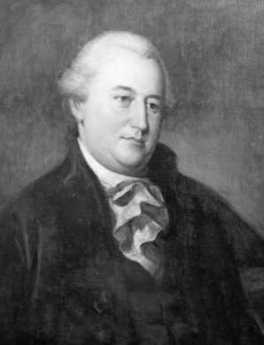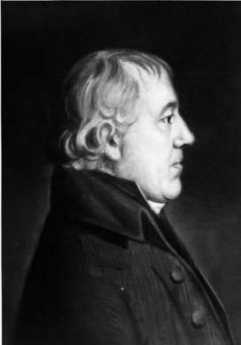0 Volumes
No volumes are associated with this topic
Fisher on Running For Office
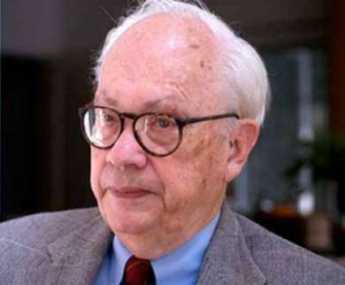 Last night, I was honored to receive the Republican nomination for a seat in the state Assembly, to represent the district where I have lived for over fifty years.
Last night, I was honored to receive the Republican nomination for a seat in the state Assembly, to represent the district where I have lived for over fifty years.

George Fisher, MD ............for Assembly ...........6th District, New Jersey ...........November 5, 2013
Naturally, I hope to win. Whether I win or lose, I expect an interesting time with a new experience. So I resolved to run a blog describing the episode, for the enjoyment of my family, the education of others considering political life, and the voters to whatever extent they are interested. I have been warned that such a website will probably be used by my opponents as political research, but that is legitimate enough, depending on the use they make of it. I have never met my opponents, so I have no reason to suspect ill of them.
Fisher on Issue Politics
|
||
| robo-calls |
Within an hour of receiving my nomination to office, I was handed a folder full of letters to answer. There were fifty of them, at least. One after another, they contained questionnaires for me to fill out, answering slanted questions in bewildering detail. Every one of them seemed to come from a national organization, dedicated to the advancement of some cause or other, from abortion to gun control, which I had not had time to consider. Remember, for years I have attended a weekly luncheon at a club devoted to discussing the news on the editorial pages and elsewhere. We have argued long and hard about hundreds of topics, but never have I encountered issues in such minute detail, cloaked in such threatening terms. There are issues in the healthcare field that I know about in detail, but they did not happen to be present in the packet of questionnaires threatening to take up hours of my time. Nor, for all I could see, were they of particular concern to citizens of my district. I'm pretty familiar with the district where I have lived for decades, and almost everyone I meet on the street bids me a Good Morning. I thought the dialogue was to be between them and me; if other issues come up, I was to use my best judgment because they trusted me. Or maybe I would have to do some research on a topic and go back to consult with the people who elected me.
But that doesn't seem to be how it will turn out if this deluge of hammering from outside issue groups is an example of what I might be in for. They aren't educating me, or supplying me with information I needed for a decision, they were threatening me that if I didn't answer promptly they would pummel me with robocalls, post-cards, maybe demonstrations by people in T-shirts with slogans, who would then get on the bus and go back where they came from, as soon as they see the television cameramen pack up and leave. I had heard of issue politics in the news media, but seeing it in action is pretty annoying. It's synthetic, it's paid for, and it gets between me and my voters.
So, when I find the time, I plan to make up a form letter, telling them as politely as I can manage that their letter is being returned unopened. Or at least, unopened by me, because perhaps "my staff" will find something of value buried in the midst of this hired trash.
Fisher -- Stump Speech
After ordering some campaign letterheads, and cards, and writing my political "CV", what am I supposed to do now? Get a haircut, maybe, and get my car washed. Be sure to say "Good Morning" to everyone I meet and don't forget to go to church. Perhaps this lull is the time to write a campaign speech, so here goes my first try at one.
CAMPAIGN SPEECH -- Fisher for Assembly. Good afternoon, fellow citizens of the 6th District. I'm here to ask for your vote to become your local representative in the State Assembly. (at this point, insert a joke).
This district's voter registration is 60/40 in favor of my opponents, so I have to work hard as a Republican, and I've got to convince some Democrats to vote for me. I've never met my opponents, so I have no reason to dislike the poor souls, except to note they are on my road, and everybody likes to be given a choice. They are incumbents, but since I have never heard of them before, their incumbency is probably a criticism rather than an asset. I'd be very happy to appear on the same platform with them in a debate, but the League of Women Voters report this is a request which is invariably declined. So, until their campaign managers say something bad about me, I'm not going to be the one to start negative campaigning. Besides, at my age, anything bad about me might be taken as a compliment.
When the Assembly was first started, right here in Haddonfield at the Indian King Tavern, the British were making it difficult to conduct a town meeting, so it seemed best to elect representatives who could assemble in some safe place and conduct business in whatever way they could. The representatives wanted to do what their townspeople wanted, but often they had to guess what was best and take the consequences if they were wrong. Generals Wayne, LaFayette, and Pulaski were rushing around doing the nation's business, but the Assemblymen had to keep the local candles burning.
The reason I bring that up is I have already been deluged with questionnaires and pamphlets, and hammered with what sound like muttered threats, from Issue Groups from all over the country. I'm not sure what the Sierra Club wants from a district that is sixteen feet above sea level. And I doubt if the New Jersey Assembly has much influence over the Alaska wildlife preserve or the possible bombing of Syria. I will be very happy to discuss such issues with all of you, but please don't expect me to have the slightest influence, even if I am elected. So these national interest groups are peddling things I don't plan to spend much time on. Please don't misunderstand. Many are worthy projects, they just don't have anything to do with the New Jersey Assembly, and they stir up animosities between me and other nice guys from Hackensack or Atlantic City which are a big source of the famously bitter partisanship you hear about.
In fact, there only three planks in my platform, and the rest of the time I plan to listen. The first, of course, is Medicine. Medicine and health insurance are state regulated, so I imagine I would be put on some medical or insurance committee where I have some experience to contribute.
The second is rebuilding the dunes along the shore. I've seen articles bitterly denouncing the use of the eminent domain, taking away the property of citizens without due recompense. Unfortunately, the State of New Jersey owns the beach, so there is no eminent domain involved unless someone has changed something. On the other side of it, I strongly disapprove of neighbors brow-beating each other about something they feel strongly about. Especially when I am afraid the ocean is going to take that beach away, all too soon. My position comes down to costs. If the dunes will probably bring in more tourist revenue than they cost, I would probably agree to take the risk. I go to the shore every summer, but I'm a renter. I never thought the risk of owning a house that blows away was worth it.
The third local issue is dredging the Delaware River. Jersey owns a side of both the Hudson and Delaware, so we are involved. The Chinese are spending heavily to widen the Panama Canal, eventually leading for Atlantic Coast ports. Delaware needs to be deepened to 45 feet, the Hudson to 50 feet. I have no objection to New Jersey supporting both of them, but I am told New York is holding up the Delaware dredging in order to let New York get finished first. And I have been told, but would scarcely believe, that some South Jersey politicians have been favoring the New York position in return for enhancing their own state-wide ambitions. If there is any truth to this, you can count on me to vote the other way.
Fisher on Political Clubs
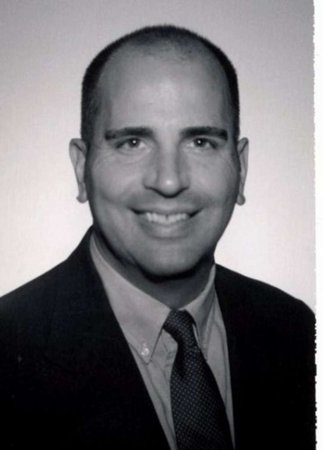
|
| Haddonfield Mayor Jeff Kasko |
My district contains 15 towns, which some people think is too many, and a topic I will return to. For the moment, the important thing is that each one potentially has a Republican Club. I've attended meetings of two of them, one in my home town of Haddonfield, and one in my opponent's home town of Voorhees. They are both composed of a surprisingly large number of eager folks, younger than I would have guessed. Although the present Mayor of Haddonfield was in attendance, the highly vocal audience was predominantly female -- empty nesters, I would judge. That may have to do with the Mayor's predecessor, who was a lively lady of several terms in office. She was also in attendance. The Voorhees Club was more predominantly male and more numerous, but equally eager and vocal. It was a great pleasure to see this activity, which some have called the Tea Party. But the original, first Tea Party ended up giving us a new Republic so you can disregard the opposition claim that they are red-necked, uneducated and vociferously religious. My strong hunch is this group attended college, although not the Ivy League. And while these newcomers to politics seem very eager to learn what it is all about, their information storehouse seemed at least as sophisticated as the general population. They are in universal agreement that it is a shame that the only major metropolitan newspaper is owned -- you heard me right, owned --by the Democratic county chairman of Camden County. So naturally, they seek their news and information from other sources.
What you have heard about Gerrymandering is definitely true, right here. Two prosperous towns were removed from the district by the Democratically controlled Legislature, presumably to shift Republican voters away from the district and make it easier for Democrats to win. And my opponent is the majority leader in the Assembly so he would want his own district easier for him to win. Right now, it's 60/40 against me in registered voters. Governor Christie is running and is very popular, so it is figured he will draw me 5% more votes with his "coattails". That means I have to find 5% of the vote myself. Which probably means I have to get 5% of the Democratic public to vote for me, or 10% of them to stay home.
Later, after going to half a dozen more meetings of political clubs in my district, I've reached another conclusion about them. You might think the serious politicians of an area would be the source of all the bitter partisanship that every part of the news media talks about, but somehow it doesn't seem that way, at all. In those meetings devoted to politics, and accompanied by a certain amount of liquor, I have yet to hear any impassioned ranting. It's all about each other's children, and the next fundraiser, and making new friends. As much as anything, these meetings remind me of my secretary, who is a raving, shouting Phillies' fan. She's really into the uniforms and the gossip, but when you get right down to it, she goes to one game a year, at most. Like baseball fanatics, these are social groups, with an organizing principle which happens to be politics. If anybody is a rednecked zealot, I have yet to meet him. This is America, and they belong to clubs. But a nagging question keeps coming up in my mind. If the serious politicians aren't angry and polarized, just who is responsible for this talk about vicious, divisive partisanship?
Fisher's Platform
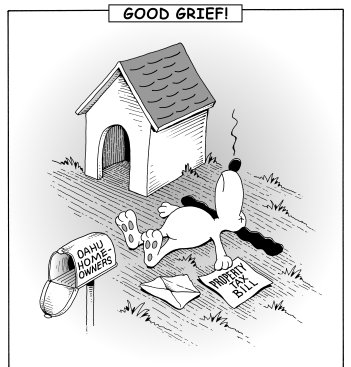
|
| Property Taxes |
To my astonishment, the front page of the Philadelphia Inquirer (owned by the Camden County Democratic chairman) carried a picture of my opponent on the front page of a paper speculating about whether America is going to bomb Syria or go to war. In addition to the news, a columnist described my opponent's platform against an outsider who hadn't even been nominated. Even more astonishing, he was mainly complaining about his property taxes, over which he must have had a considerable influence in the past. Since property taxes are public news, I looked up his own. My secretary tells me they are less than she pays for her bungalow in a nearby town, and a quarter of what I pay. It's a well-established principle of law that a person can have more than one residence, so maybe he is paying more at some other address, but this is what they say he pays at his home, much further away from crime-ridden Camden than I live. In case he wants to know, I paid $30,000 for it, many years ago, and now the taxes are almost that much, every year.
Actually, the local taxes are twice as high as they seem. The state legislature pays the town an equal amount, which of course ultimately comes from state income taxes. Several years ago, the Legislature gave us this break, but it's just a shell game. You take it out of one pocket and put it into another, noisily calling it a big saving for the taxpayer. The State also took over the fringe benefits for municipal employees, so most of the municipal tax is hidden, and the state pension fund is what is threatening the state with bankruptcy. This is pretty serious business, and only one person is in a position to do something meaningful about it -- the Governor. The New Jersey Constitution gives unusual power to the Governor, if he has the guts to use it, and if the Legislature lets him. Christie seems to have the guts. So, much depends on the majority leaders of the two houses of the Legislature, one of which is my opponent. No wonder he is making a show of his shock, shock, at the tax situation. If he really cooperates because of public opinion, the remaining question is what secret price he will demand, in return for his show of affection. If you are looking for who caused this mess, look at Corzine and McGreevey -- that was really quite a pair. My job, and perhaps the only one, is to spend the Democratic majority leader in the election on November 5. After that, I won't have much effect on lowering taxes as a single Assemblyman, but Christie can do it, and maybe I can help.
The other thing I can help with is sorting out the Obamacare mess in New Jersey. I'll take that subject up in a later blog. Meanwhile, I'm boning up on dredging the Delaware River, fixing the sand dunes at the shore, and the New Jersey Constitution -- just in case someone asks a question. I might even have a look at the budget, but for that, I would need the help of an accountant who understands the tricks in it.
Fisher on Representation Size
Fisher on Representation Size
|
||
| Constitutional Convention in 1787 |
According to the last census, my Legislative district (#6 in New Jersey) has 224,000 residents. If I spent five minutes talking to each one, I wouldn't have time to sleep or eat. Therefore, I get mixed feelings when I hear only 43,000 of them are registered voters, and only 23,000 of them turned out for the last election. I guess I could talk to that many, but it is pretty sad only one resident in ten bothers to vote. The same number of people voted for every R candidate, and the same number of D's voted for almost every D candidate. So, it looks as though a lot of people vote a straight-party ballot.
That's something they surely wouldn't do if they knew each candidate. And that's pretty sad because it is easily managed by party machines. I have to think these things are caused by the steady growth of the population, without comparable growth in the number of representatives, at all levels from township commissioner to President of the United States.
George Washington was bothered by the same problem. In 1787 he had nothing to say about issues during all the time he was the presiding officer of the Constitutional Convention. But on the last day of the convention, he asked for permission to step down and address the group. His conviction was that no congressman should represent more than 30,000 people, and he begged for an amendment providing for it. The delegates meant to oblige him, but somehow it got lost. If they had done what he asked, we would now have about 5000 congressmen, so it doesn't sound workable. As a practical matter, in the early 1920's Congress finally limited the size of its members to 436. So now we have exactly what Washington feared, which is each Congressman represents 700,000 people, nobody knows his congressman, it costs millions of dollars to get elected, party machines dominate what decisions aren't dictated by lobbyists.
Exactly the same thing is true of legislative districts, except the lobbyists are probably less well funded. They seem to search for party machines and spend their time (and money) on unelected party leaders. Unelected is an important word here because many county leaders take care not to hazard their future on an election. I understand the county leader in Mercer county lives on eighteen acres in the center of Princeton. I don't know his name, in fact, almost nobody knows his name, but everybody knows that God himself couldn't afford eighteen acres of Princeton. I got this from a reporter, Bob Ingle, for the Trenton newspaper who wrote a book, called Soprano State. I wish more people would read that book, so I don't have to sound so negative at times. I gather from this book, there is much to talk about.
Anyway, this representation issue is starting to hurt. I go to all kinds of meetings in my district, at least to show my face. Little did I expect I would be sitting in the audience while a professor of history, would explain that Washington's proposal was already part of the Constitution. I woke up slowly and may have got this wrong, but I believe he said it was one of the two (of the twelve original) amendments of the Bill of Rights that Thomas Jefferson recorded as not being ratified. However, Kentucky was a long way away by horseback, and the ratifiers seem to have given up on the messenger who was bringing the duly recorded, on-time, ratification from Kentucky needed to reach the required number. I guess when it got to be dinnertime they decided no messenger meant no ratification.
However, Mr. LaVerne seems to have dug up photocopies of the Kentucky document of ratification, plus the bylaws stating amendments were to be effective as of the date of ratification. Somehow, the War of 1812 got things confused even more and burnt up enough, that Washington's pet idea sort of got lost. If that's really provable, it seems to mean we already have a mandate to have 5000 congressmen (and two or three thousand Assemblymen and women in New Jersey?). The contention seems to be that for two hundred years nobody knew what to do with this bit of history, and sort of decided to ignore it. My view is that even if you knew all about this strange history, you simply can't have it both ways. Either you get stuck with the present inability to represent all those constituents, or else you get stuck with having unworkable thousands of congressmen.
I promise to think about this. And when I get an answer, I'll let you know.
Fisher on Meeting With the Enemy
Last night I went to yet another of the endless round of parties that a political candidate discovers is his life. This one was a fundraiser for a dilapidated cemetery that needs help with its weeds and neglect, even if George Fox the founder of Quakerism was the original founder, and William Penn its original funder. Almost immediately, someone thought it was natural to have me meet the cartoonist for the Philadelphia Inquirer . Although she regularly portrays my political party, and sometimes my political beliefs, with what anyone would call a partisan slant, she turned out to be a charming freckle-faced blonde. Straight and athletic, she seems to row on the Schuylkill to keep in shape, and all in all is a charming company. She quite readily admits to being upset about all the hate mail she gets from the victims of her cartoons, but cheerfully keeps it up. I didn't ask where she went to college, but there seemed to be the characteristic Bryn Mawr mixture of forcefulness and good breeding. The good breeding which is so visibly lacking in Nancy Pelosi, let's say.
So it seemed to me I was observing another one of a succession of examples of people with water-tight compartments in their thinking. She was visibly upset by the recent episode of the torching of the new Chestnut Hill Meetinghouse. It would appear that the Quakers used some non-union labor which was so resented that person or person unknown used welding equipment to cut the steel girders, trying to topple the place at night. This is behavior so characteristic of unions of the past, that pretty much everyone feels he knows who did it, and why. In fact, it wouldn't have any intimidation value if people did not think that. And yet our cartoonist is a union member and keeps right on supporting them. I think she is troubled, but somehow she is not converted.
And maybe I am getting an idea of where the vicious partisanship in politics idea gets its start. Are we really going back to the Molly Maguires?
The Absent Booker
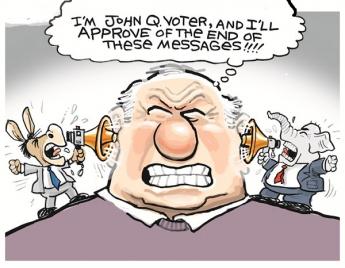
|
| Political Ads |
Since the theme that is growing on me is that the ever-growing population is injuring our election system, it was startling to read in the paper that a candidate from New Jersey who is running for U.S. Senate is not even making campaign appearances. Mr. Booker is definitely not running in the same election with or against me, and in fact, I never heard his name before, never met him, and have no reason to suppose he would be a bad Senator. Or a good Senator, either, and wait to see him identify himself in the campaign for an important job. But it was certainly startling to read in a newspaper known to favor his party that he isn't campaigning, he's in California. He is said to be on the West Coast looking for campaign contributions from movie stars -- for the election after this one, where he is being promoted for President of the United States. I understand it's a good campaign strategy to project the image you are invincible, but this is really an extreme case.
And so, if for no other reason, I'm inclined to hope he loses, because I hate to think this is a growing tendency. All that seems to count in this strategy is to harvest a big pot of campaign money, hire some ruthless ghostwriters, and pour campaign money into spot TV ads in the week before the election. I expect to hear some dreadful things about his opponent and I don't know whether to believe them, considering the source, and remember I won't even get a chance to hear it in person.
These images are contrived and synthetic. As the population continues to grow, we can expect to watch more and more of this sort of thing. Somewhere I got the idea that the airwaves are public property. What right do the TV stations have to make such astounding amounts of money from our election process, using public property to do it? I'm told the available time in October is completely reserved, for months or years in advance, and that a majority of the revenue for many stations comes from the month of October. The only owner of a TV station I ever heard of, was Lyndon B. Johnson, so you begin to get the idea. Maybe we can't do much about the growing population, but we certainly ought to be able to make a publicly owned airwave available for even a poorly-funded candidate to use.
How They Do It in Delaware

|
| Founding Fathers |
Come to think of it, the nation's smallest state still does things the way the Founding Fathers did them, sort of confirming my feeling that population growth is the source of our trouble. Correction: the failure to adjust to population growth is our trouble.
They really do "bury the hatchet" in Lewes, Delaware, and they really do get the candidates, victor and vanquished, to ride around the town square in Georgetown, Delaware after the election is over. The implication is, of course, there was a hatchet in use, and yet the two candidates can be cheerful gentlemen afterward.
Georgetown Returns Day

|
| Georgetown |
Early in November, two days after each election, Georgetown Delaware puts on a festival called Returns Day. About two hundred years ago, there was a law that all ballots had to be cast in person at the courthouse in the county seat (Lewes, at that time), and it took two days to count the votes. Everyone, candidates included, would hang around at the courthouse to learn who had won. After a few elections, except in wartime when the ceremony was temporarily skipped, the popular tradition has continued even though of course the election results are known much earlier. Although the function of revealing election results has yielded to the news media, the ceremony has assumed importance for its own sake. Unless it rains pretty hard, the parade lasts three hours, with ten or twelve marching bands, and local amateurs struggling with bagpipes. The candidates, winner, and loser, ride gamely around the square in horse-drawn carriages. You can imagine what would happen to the political future of any candidate who declined to participate in what is now a mandatory public entertainment.
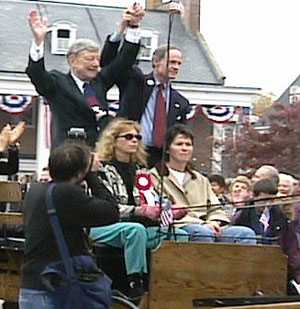
|
| U.S. Senator from Delaware |
Two features of this festival are especially notable. There is a hatchet-throwing contest, trying to get the flying hatchet to catch one corner in a post. It's not an easy thing to do. And then there is hatchet-burying, which is said to date back to the Nanticoke Indians. The traditional hatchet is brought from Lewes, as is the sand. This is all said to be the origin of the folk-saying about burying the hatchet, and it's really very heart-warming to believe the election is only an election, and the competition is over. It's probably not entirely true, of course, but it symbolizes what the public wants to believe is true. And what the public is telling politicians -- had soon better become true, again.
Fisher on Stuffing Ballot Boxes

|
| Stuff the Ballot Box |
Shortly before election last year, the papers were full of agitation about passing laws to require voters to identify themselves. That doesn't sound so burdensome, considering how teenagers pester you to get a driver's license when they reach a certain age. But, oh my goodness, it was a terrible thing to ask of voters who are barely able to crawl to the voting place, much too poor to afford a car, and grossly offended by the suggestion that anyone would dare to have such nasty suspicions. So, being new to the candidate business, I asked a few hardened old pros about it. Is there much voter fraud in Camden County? And if so, how is it accomplished?
For some reason, this innocent question was greeted with gales of laughter. When it settled down, two or three suggestions were offered. In the first place, said the old guy on a park bench, tell the poll watchers to be certain the voting machines have been set to zero before any voter uses them. How would requiring a driver's license prevent that kind of thing? It wouldn't; it depends on having poll watchers.
All right, what else? Well, there's the "old fashioned way". What that refers to is waiting until about an hour before the polls close, and there is nobody watching in the polling place because it's dinnertime. When the coast is clear, just take the list of registered voters who haven't yet voted -- and vote them for your party. Pretty smooth, right? And if you would be required to write down the driver's license number for every voter, it's pretty easy to spot deficiencies when the results get challenged. So, maybe requiring some sort of ID would be effective, and wouldn't amount to frisking a citizen. And then, there's a law to mention.
In New Jersey, and maybe elsewhere too, a poll watcher is required to be a resident of his district. So, a little old lady with knitting is unlikely to want to watch the polls in some of the tougher districts. For this, both parties employ "flying squads" of some of the party faithful who look like professional football players. One beep on the cell phone and this squad come flying. Well, my Goodness me.
Written several months later:
Judge Richard Posner, whose writings I have come to admire greatly, was interviewed recently on television. Although he said he had written earlier that he saw nothing wrong with asking voters to identify themselves, he now reverses himself and concludes that voter identification laws prevent more people from voting than they prevent fraud. He bases this opinion on what someone tells him is credible evidence, but I'm afraid I neither believe the evidence nor think it is an important way to think about this issue.
I believe the most important issue is to have the public believe the elections were fair, so we don't get more civil disobedience stirred up by political "contractors", or in spite of heated fanaticism heating up in the last few days of an election. There are numerous examples of candidates who supported a fraudulent election of their opponent, rather than have his own supporters injure the reputation of our procedures. Somebody has to win an election, and the election has to be seen as final. In our system, any close election could probably be reversed by a well-managed recount and reversed again on re-recount. To discover large frauds, even if potentially balanced by improved enfranchisement, is to discredit the election process. And since there are many local polling districts near me which have not had dual poll watchers for twenty years, the suspicion of voter fraud in those districts is quite a natural one. I"m not sure what the issues are, surrounding the credibility of absentee ballots.
All I know is a lot of people are increasingly resorting to them because they distrust the conventional polling places. If that's what it takes to convince people the elections are fair, let's try it out wholesale in some districts where obtaining dual poll watchers has been difficult. Like Chicago, for instance?
Fisher on the Coming Physician Shortage

|
The 11th Assembly District is somewhere to the North, and two Republican ladies, Caroline Casagrande, and Amy Handlin, are running for the office. I don't know them, but I approve of the message in their local newspaper. They feel that Obamacare is going to create a physician shortage, and it certainly does feel as though it's already getting hard to find a doctor. If you think about it, you'd have to agree that giving health insurance to many extra millions of uninsured people would put strains on existing supplies of doctors. But there's a related point to make.

|
I'm quoting Roger Egeberg MD, here, who was General MacArthur's chief medical aide in the Pacific. He later became Assistant Secretary of Health, where I got to know him. He expressed disapproval of salaries for doctors in the strongest possible terms. When I asked him why he would say that, he replied, "If you put doctors on salaries, you will get an instant forty-hour week, and after that, you will get an instant doctor shortage." Although I don't know that it would be instant, I think he is probably right about the general idea. Piece work makes you work longer and harder, and for that reason alone a lot of people hate piece work. Doctors call it "Fee for Service", but it's piece work.
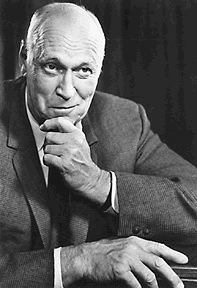
|
In a way I'll explain in another blog, the DRG system of paying hospitals by the diagnosis rather than by itemized services is encouraging hospitals to form satellite clinics and buying up doctors practices to fill them. That's because inpatient patients now lead to a profit of 2%, while the accident room has a profit of 15%, and satellite clinics a profit of 30%. On a national average, of course. Naturally, hospitals see their future in captive doctors on hospital salaries. Meanwhile, if a hospital gets paid by diagnosis, it doesn't matter how long you stay, Medicare pays the hospital the same amount. And it doesn't matter how much lab work or x-rays are done, the hospital gets paid the same. Somehow, I don't think you save money with such a system. And that's the type of system the Affordable Care Act promotes.
Meanwhile, the Medical School deans are responsible for matching supply and demand, and they rather favor the salaried practice. So the hidden cost here is likely to be for an increase in the number of medical schools. Cutting sixty hour weeks to forty hour weeks would require fifty more medical schools. But it then takes six or seven years for a new medical student to become a new doctor in practice, and you have to figure in several years to find the money and to build a new school. So, if it gets done efficiently, it will take ten years at least to recover a balanced supply of doctors.
Fisher on Proposed Economic Zones
There's an idea that politicians are all negative characters, saying nasty things. That's probably because the public only listens to them during the last week of a campaign when campaign advisors urge them that negative works best. So, here's a positive idea. And it comes from Camden County Republicans.
There's no doubt New Jersey is in a fiscal squeeze. Our property taxes are second-highest in the nation, but our municipal bonds are regarded as risky unless we raise taxes or cut spending. If we raise taxes, people will move to other states. In fact, we mainly haven't lost population because New York City is more heavily taxed, so New Yorkers move to New Jersey. Philadelphia has lost 40% of its population since the peak, and if you ask your neighbors, many of them moved from Philadelphia. Camden City just moved away, period. The people you don't talk to are the ones who have moved from New Jersey. So we are afraid to raise taxes, and we are a little afraid to cut them for fear the municipal bond market will strangle our borrowing power. Here's the proposal.
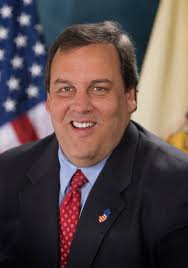
|
| Governor Chris Christie |
While we continue with Governor Christie's efforts to cut spending, like getting rid of those 800 paid Committees, and seeing if defined benefit pensions can be converted to defined contribution plans, and the like, let's cut taxes where it would help the most. The Camden County Republican proposal is to cut taxes in defined enterprise zones. If we can attract some new businesses into those zones, they and their employees would pay taxes, and the gamble might pay for itself. It might not, of course, but that's the risk any businessman takes when he makes an investment.
Right now, Exit 4 on the Turnpike is not in Legislative District 6, because the borders get shifted around by gerrymandering. But it's close, and most of the business activity it has created is within District 6, along the route toward Philadelphia. Most of the theory of business clusters suggests that a cluster of business activity is most sustainable when it contains a diversity of industries, but it needs a dominant industry to get started. Tom Booth suggests medical supplies already have a big start in our geographical area, and I can agree that eighty percent of the pharmaceutical industry is located within a hundred miles of us. Burlington County has demonstrated that you can keep everybody happy if you segregate commuters and farmers, which means helping the environmentalists and the businessmen at the same time. It really can be done and is being done by some of our neighbors. Not a bit of doubt you have to be careful about creating winners and losers, because that's where the graft comes from. But there's no doubt if you succeed, you will succeed big.
Cutting (some) taxes and helping the deficit at the same time. Just think of that. And think about 13% of unemployment in Camden County. We have to do something about that or it will destroy us.
Burlington Leads the Way
Somewhere in the past few decades, Burlington became quite activist. Although many tend to think of real estate planning as urban planning, this largely rural county went in for planning in a big way, deciding what it was and what it wanted to be. Generally speaking, its decision was to replace urban sprawl with cluster promotion. The farmers didn't like an invasion by McMansions or industries, while the towns lost their vigor through tax avoidance behavior of the commuter residents. Overall, the decision was to push urban development along the river in clusters surrounding the declining river towns, while pushing exurban development closer to logical commuting centers, leaving the open spaces to farmers. Incentives were preferred to compulsion, with a determination never to use eminent domain except for matters of public safety.
To implement these goals, two referenda were passed with 70% majorities to create special taxes for a development fund, which bought the development rights from the farmers and -- with political magic -- re-clustered them around the river towns. The farmers loved it, the environmentalists loved it, and the towns began to revive. The success of this effort rested on the realization that exurbanites and farmers didn't really want to live near each other, and only did so because developers were looking for cheap land. Many other rural counties near cities -- Chester and Bucks Counties in Pennsylvania, for example -- need to learn this lesson about how to stop local political warfare. Corporation executives don't want to live next to pig farms, but pig farmers are quite right that they were living there, first. When this friction seeps into the local school system, class warfare can get pretty ugly.

|
| Burlington Bristol Bridge |
In Burlington County, they thought big. The central project was to push through the legislature a billion-dollar project to restore the Riverline light rail to the river towns, along the tracks of the once pre-eminent Camden and Amboy Rail Road. It was an unexpected success. During the first six months of operation, ridership achieved a level twice as large as was projected as a ten-year goal. Along this strip of the Route 206 corridor, the old Roebling Steel Works are becoming the Roebling Superfund Site, now trying to attract industrial developers. The Haines Industrial Site originally envisioned as a food distribution center was sold to private developers who have created 5000 jobs in the area. Commerce Park beside the Burlington Bristol Bridge is coming along, as are the Shoppes of Riverton and Old York Village in Chesterfield Township. As Waste Management cleans up the site of the old Morrisville Steel plant across the Delaware River, a moderate-sized development project is becoming an interstate regional one.
No doubt there will be bumps in these roads; the decline of real estate prices nationally is a threat on the horizon, because it provokes a flight of mortgage credit. It works the other way, too, as banks decide to deleverage by reducing outstanding loans; this is the way downward spirals reinforce themselves. And anyone who knows anything about all state legislatures will be skeptical about political cooperation in a state as tumultuous as New Jersey. The Pennsylvania Railroad destroyed the promise of this state once; some other local interest could do it again. Nevertheless, right now Burlington County looks like a real winner, primarily because of effective leadership.
Fisher on an Assembly Provision
You'll have to read this next one to the end, to see why it is really a proposal for the New Jersey Assembly to consider. However, out of character, it may seem at first.
Barnes Foundation -- Drawing a New Moral

|
| Andrew Stewart |
Andrew Stewart, the Public Relations Director of the Barnes Foundation, and for thirteen years a member of its Board of Directors, recently addressed the Right Angle Club. He gave a new slant to the quarrelsome saga of Dr. Barnes' will, offering the point of view in favor of moving the paintings to the Parkway. It's useful to hear the legal and historical background because about all we hear are criticisms, balanced by joy at having the famous paintings where we can see them.
Essentially, the will declared a wish for the School and Museum to follow the original indenture. After the passage of time, the old board members died off, and the new board members found the Indenture to be out of date, like specifying the purchase of railroad bonds. Delivered in a charming Scottish brogue, the argument was fairly convincing. But it stimulated in me an entirely different moral from the eternal dispute between the right of a man to have respect paid to his expressed wishes for his own property, versus the self-defeating quality of the same restrictions with the passage of time.
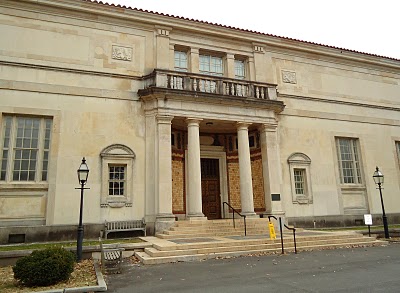
|
| Barnes Foundation |
Barnes was born in Kensington, and had a hard life as the son of a Civil War veteran who lost an arm in the war, and had a dismal time making a living as a butcher. Barnes was his fighting-spirit son, who worked his way through medical school. It was Jefferson Medical College, where I was on the faculty for decades. While it is true his patent medicine gave a permanently sickening color to the children who were treated for sinusitis, it is also true that in the form of eyedrops it prevented the transmission of syphilis to millions of newborn children. In that view, it was a real scientific contribution, although the medical profession continues to take a dim view of doctors advertising their wares. Although he was himself a failed artist, Barnes was a highly successful collector of (then) modern art and started a school with John Dewey to teach art appreciation to poor people. One by one, the local universities snubbed his wishes for an art appreciation school, and the local Philadelphia museums were pretty sniffy about his favorite artists.
In fairness to them, Barnes was probably pretty pushy in his demands. Unfavorable local reception to an exhibition which had received rave applause in Paris, convinced Barnes he was right and they were wrong. After this, Barnes developed a lasting hatred of Philadelphia and all its stuffy ways; he definitely didn't want his own impressionist art to be in Philadelphia, which would never appreciate it. While Philadelphia finally woke up to the value of Impressionist painting, Barnes never relented while he was alive. I hope I give a fair portrayal of the argument except for the politics and the legalities, that I know very little about.
But hearing the arguments, I see an entirely different moral to the saga. Ever since the inflation of the 1930s, fine art has appreciated in value, faster than the endowments to maintain the art. (That's probably a useful tip to investors, too.) It's fairly standard for a wealthy person to donate his art collection, plus a sum of money to endow the maintenance of the art. Most of the time, the size of the endowment is carefully calculated to grow at least as fast as the value of the paintings, because you have to ensure them, and pay for increased security, and increasing attendance. With the new trend toward inflation of at least 2% a year, the old premises don't work anymore, and the endowment eventually runs out. At that point, it runs into restrictions which -- to be perfectly blunt -- were created to prevent the trustees from pilfering the museum. A museum may not sell its art to pay for administrative expenses.
Consequently, The Barnes ran into a situation where it had billions of dollars worth of paintings in the basement, which it could not sell, and could not even hang in the museum because of Barnes' specifications for what went on the walls. This situation isn't going to change, because a dollar in 1913, when the Federal Reserve was created, is now scarcely worth more than a penny. And the present Fed is committed to 2% inflation, forever.
So, how about this: let the lawyers who write wills, and the Orphan's Court which administers them, insist that the art collection be divided into two parts. One would be the permanent collection, just as at present, and the other would be eligible for sale in the judgment of the Orphan's Court.
A Healthcare Reform Obamacare Forgot
A recent letter to the editor by a New York doctor, gave me pause. He notes that medical schools seldom bother to calculate what it costs to run them because they just set tuition prices as high as the market will bear. My own reflection on this is the medical schools may not be at fault for it, and in fact, may actually be fighting a losing battle with the parent universities. I'm not privy to the hidden wars between medical school deans and university presidents, but I strongly suspect that medical schools are being abused, not the other way around. Of course, no one will admit anything.
But I got it from a book and checked it out with a friend in high places, that at least one medical school transferred the entire tuition from the medical students to the parent university. And they kept it up for ten years. That would now be $50,000 a year apiece, times two hundred students in a class, times four classes in the school at once. Anybody can guess that would be a lot of money, but there are 170 medical schools. They all may not do it, they may give some scholarships, and some state schools may charge less tuition. Yes, yes, but if you do the simple math you can scarcely believe your eyes. $50,000 times four, times 200 in a class, equals $40million per school. But that's just one school, so $40million times 170, equals 3800 million, equals $3.8billion. Now, we're beginning to talk real money, although of course, it's actually less than that. But it certainly is what the lawyers call probable cause, a conclusion which justifies the investigation. It raises a vision of a lot of medical students going $200,000 in debt to pay for something or other in the liberal arts colleges, while the liberal arts students make protests about rich doctors. And, whatever is done with it, and however much it is less than $4 billion per year, the patients in the medical system will eventually find elevated medical costs must pay for it. I doubt very much the voters would vote for the arrangement if they knew.
And then, to be credible, you have to conjecture how the schools could survive without tuition income. Well, I suggest we take a look at the indirect overhead for research, which equals an additional 69% payment beyond the cost of the research, paid by the N.I.H. and supposedly pays for libraries. Maybe a few lucky schools pay for the missing tuition with donations. And also look at the Medicare-subsidized salaries of the resident physicians, so recently fleeced of their $200,000, but trying to pay back their loans.
Fisher on the Environment
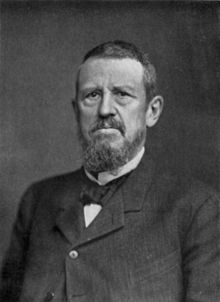
|
| Joseph Wharton |
I grew up in Pittsburgh, where they kept the street lights on all day for several days each year. So I'm well aware of environmental issues, and the dangers of neglecting them. At one time, the forks of Ohio were world famous for their beauty and now look at them. Furthermore, I know the story of Joseph Wharton, after whom the Pine Barrens were named because he owned them. Mr. Wharton wanted to pierce the Pine Barrens with drill holes down to the so-called Cohansy aquifer of the purest water known to man. Wharton planned to pipe the water over to Philadelphia, but even then there was enough public outcry to stop it. No doubt we ought to have experts thoroughly examine the matter before we permit the destruction of that neighborhood jewel.
But the Alaska Wildlife Preserve and the fate of the grizzly bears, now really, should that really be a concern of the New Jersey legislature? Really, give me a break. We have plenty of local concerns that the New Jersey Legislature might actually do something about. Like sending a doctor to the legislature to speak for the interest of the patients, amidst all of the confusion of rather vague healthcare reform. The plan seems to be to put the uninsured into Medicaid, the most rickety, underfunded program in American medicine. When those people discover what Medicaid is like, there's going to be an uproar of some kind. That will probably lead to hasty re-adjustments, and someone has to speak out about the effect on patients, from the program or the reaction to the program, or both. For that, I'm your man.
CANDIDATE MAIN PAGE
As I was rushing out of my office one evening, trying not to be late for a rather large gathering of constituents, I was suddenly confronted by a nice young lady holding a piece of paper, closely followed by a young man with a big professional TV camera. I like to think they were lying in wait for me, but more likely they were haunting the Starbucks across the street.
The question was fired at me, what did I think about Governor Christie using the Supreme Court about gay marriage? I had to admit I don't watch TV all day long, so I hadn't heard about it. Well, do you think it is appropriate for the Governor of a state to sue the Supreme Court? Huh, do you? Caught totally by surprise by a question I don't know much about, I answered, or mumbled, that it seemed to be a lawyer's question, and I'm not a lawyer. I do know that the U.S. Supreme Court will refuse to take a case unless the plaintiff can show he has sustained a personal loss of some sort. But I don't know anything about the New Jersey Supreme Court or its rules, and the whole thing seems to me to be above my pay grade. Or something like that.
If I had had more than ten seconds to think about it, I might have said, "What you really are asking me is Don't you think Christie is a bad, insensitive person?" And my answer to that question if put a little more plainly, would be, "No, I like Governor Christie a lot and I trust a former U.S. Attorney to know the fine points of law better than I do, so I support him."
And if I am wrong, and the real question you are asking me is Am I gay? Then, my answer would be, "No, I'm not gay one bit. But I am inclined to let other people do as they please, as long as it is harmless to others."
And if the hidden question is do I approve of people being gay, I would have to answer that if everybody were gay, it's pretty hard to see how the human race would survive. Now could I ask you a question? Who are you, and who is paying you to ask me slanted questions?
Follow-up, written the next day: The next day's newspaper gave an entirely new slant to this little episode. It seems the decision was made by the Superior Court, not the Supreme Court, and Governor Christie appealed the decision, he did not sue anybody. So the whole interview process was a put-up job, slanting the attention away from a record-breaking court decision to Governor Christie, who was dutifully responding to a Superior Court ruling which overturned a state law. All the rest of it was either intended to shift attention or else to tangle me up in a confused reaction to some events which didn't happen at all.
In that case, let me state my central position. Governor Christie is a great guy, who definitely needs to win re-election next month. And I am running for the role of Assemblyman for the 6th District, prepared to help him in every way I can.
Follow-up, written two weeks later: Presumably, after a week or two of consultation with experts, and watching for public reaction, Governor Christie withdrew the state's appeal of the Superior Court decision. That would appear to be the end of this phase of the matter, because there is no one else with the "standing" to appeal a state law, and gay marriages will at least go ahead, unrestrained by the State of New Jersey. All sorts of things might or might not happen, like passing a new law that answered the Court's objections. Or someone might feel injured by the present state of affairs and sue for redress of damages. After wracking my brain to think of someone who was injured, let's consider some elderly couple without children. Since state marriage laws are primarily designed to protect mothers and dependent children, gay couples would appear to be in much the same situation as non-gay couples unable to have children. I have never heard of anyone protesting that couples unable to have children are receiving preferences they don't deserve, but it could happen I suppose, and the non-gay couples might lose some legal advantages they had grown accustomed to, feel aggrieved about it, and sue somebody because they lost those advantages. It sounds pretty far-fetched, so in likelihood, no one will sue, and in a few years, the matter will fade away. Some other state might keep the issue alive by its courts deciding differently, of course. But generally speaking, it looks as though the issue of gay marriage is settled in New Jersey, and the legislature can turn its attention to less exciting subjects, like dredging Delaware or building new houses at the shore after Hurricane Sandy. Or, what in the world are we to do about all those people who have been relegated to New Jersey Medicaid by the federal Obamacare legislation. Oh, yes. There's that matter of high state and local taxes.
What Is the Right Shape For a Legislative District?
At first it comes as a surprise, but soon seems natural, that the first question people ask me is, "What's the Sixth District -- do I live in it?" So the answer is: it stretches along the White Horse Pike from Pennsauken to Voorhees, including about fifteen towns, listed at the top of this page. A considerable number of people are uneasy that some of these towns will get consolidated to reduce expenses, but you usually hear that from established residents. The newcomers, mostly younger people, have fewer local loyalties, but the fact is most residents of a town seem to know very little about the other towns in their district, except for high school football rivalries.
Some of that may be caused by rather regular re-arrangements of the districts, which in turn is occasioned by the steady growth of population. Camden County is gradually coming to the end of a transformation of a farm county into a suburban county, and when that settles down the area should become more stabilized. That probably accounts for the rather large number of people who call themselves Independents. There are more Independents registered in this district than people affiliated with a party. Newcomers generally feel uncertain about local issues and uncomfortable about taking a position on them without more information. Judging from the poll results, it looks as though Independents are more likely to vote a straight-party ballot, just the opposite of what might be supposed. Not knowing the local issues, they vote for national ones or just stay home at election time for local issues. Gerrymandering probably is involved in this mix. Local observers say you can predict the politics of the next ten years if you know how to interpret the gerrymandering after each census. In fact, those who have studied the long-term history of the state, say they can see the trends in ten-year waves.
A "Voting District" is itself a local New Jersey phenomenon. There was a time when each county had a state senator, while the Assembly was divided by population. That led to a regular division of urban versus rural, reflected in a rural Senate and an Urban Assembly. That tended to slow down legislation, just as it is now seen to do in Congress, but it gave County politicians more power. A Constitutional revision in New Jersey eventually broke this tradition. We now have "Voting Districts", each one with one Senator and two Assemblymen. Students of political science favor a bicameral legislature, with the two houses elected by different means, deliberately designed to slow down concentrated power plays. Essentially, New Jersey now has what amounts to a unicameral legislature, according to this view of things. So there you are. New Jersey tried it one way and switched to the other. It may not make a great deal of difference, since the real political division is between the Northern end, oriented toward New York, and the Southern end, oriented toward Philadelphia. As Benjamin Franklin once put it, New Jersey is a keg, tapped at both ends.
So, What is so Good About Christie?
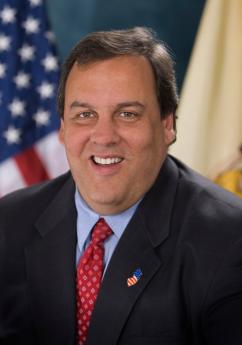
|
My daughter lives in Pennsylvania and therefore doesn't know what's what, recently confronted some New Jersey Republican politicians with a question. "Governor Christie is a great politician, and I love his confrontational style. But tell me truthfully, just what has he done that's so great?" Great question, daughter, and I'm going to give you a straight answer.
In the first place, he attacked the 800 or so committees created by the legislature, and cut them down to about 300, by threatening to reveal their existence, and the hundreds of paid stipends they passed along. And then he made great strides toward a balanced budget, protecting New Jersey municipal bonds from the default, in spite of opposition majorities in both houses of the Legislature. Remember, since the biggest item in the New Jersey budget is for pensions for state employees, he's making substantial progress toward converting defined benefit pensions into defined contribution pensions. You don't need a detailed explanation of what that means, beyond knowing it would make a substantial reduction in future pension costs, as would some other reasonable suggestions, like 401(k). The IBM Corporation was the first to start such a change, and believe me the unions fought it, but now are glad they got it because it is portable. The bond markets are heavily influenced by public opinion, and the opinion became, this Christie guy is serious.
And to repeat, all this was accomplished with both houses of the Legislature controlled by the opposite party. Contrast this with the insults and misrepresentations by President Obama of his Congressional opponents. Nobody could expect much cooperation from the loyal opposition after attacks like that. Christie may have implied some threats, but he had the good sense not to project nasty insults, and remains on good terms with his opponents, in forgivably Jersey style. In fact, he gives them certain respectability they lacked before he convinced them the old ways, just couldn't continue.
And then there is the astonishing move toward wedging part of the Union movement from its former perpetual affiliation with the opposite party. Some racial and religious population groups once made the same political mistake: the Republicans wrote them off and the Democrats took them for granted. Either way, they failed to achieve the clout they were entitled to. It just isn't a smart way to behave in a democracy, and the Unions have fallen into the same trap. Or, maybe union leadership is now waking up.
The American union movement is divided into industrial unions in the private sector, and government employee unions in the public sector. The government unions are gaining members, while the industrial unions are steadily losing members, for reasons I'm too polite to mention. Give Christie credit for starting a tectonic shift with a hint to the industrial unions, implying every time the public sector got a raise, the private sector got a tax increase. In New Jersey, that hurts, because government employee unions and industrial unions are not a natural mix. After all, Christie balanced the budget without a tax increase for two successive years.
That's part of the reality in Deptford Township of Gloucester County, where Sunoco decided to get out of the refinery business. Hundreds of union members are out of a job, still facing the second highest taxes in the nation, if they continue to live there.
What Lessons Can We Learn From the Mt. Laurel Decision?
Let's be clear; Mt. Laurel isn't in my district, which is District #6. Nevertheless, the courts have decided in two cases (Mt. Laurel I and Mt. Laurel II) that the little town next to the Turnpike Exit had to provide the area with a certain minimum amount of "affordable" housing, and that decision does considerably agitate District 6, along with most of the rest of the state. That was forty-three years ago, and lawsuits delayed implementation until 13 years ago. Both the legal cost of this episode, and the rancorous discord, were enormous. The New York Times recently published a follow-up story about the improvements that had occurred in the lives of the 140 families in Mt. Laurel, arguably as a result of better homes than they previously could afford, better schools, a safer environment, and maybe, better neighbors. The reporters said they could find no evidence of the increased crime in a peaceful town, or uproar, or major resentments.
The resounding response that I have heard is to the effect that "The Mt. Laurel decision isn't about Mt. Laurel, it's about a lot of other towns." It's hard to know whether that response means to suggest that anticipation is more destructive than the event, or that Mt. Laurel was exceptional. Some of it surely reflects the opinion that the sweeping generalizations of the court are not applicable to some other towns. It is fairly observable that the officials of towns and local real estate interests are far more upset than the general public is, although people are ready enough to agree when someone in the building trade brings the matter up. Some of that is a local issue: the post-war de-industrialization of Philadelphia and Camden City created many scenes of neighborhood abandonment when lower income people moved into a depopulating area. Sometimes in-migration was a cause, sometimes it was an effect, but local people are well aware of what can happen when panic breaks out about falling real estate prices. A house is normally the most valuable property anyone has. The Times article was meant to reassure such people, but it is probably going to leave many unconvinced. For one thing, the Commission established to implement this court decision has not adequately restrained the zealots in their midst. It is clear this is a touchy issue and needs to be treated as one. Haddonfield, for example, does not have a single vacant lot, and feels needlessly hassled when it is criticized for lack of affordable housing./p>
The same needs to be said of the court. It could have made a much narrower ruling, perhaps confined to Mt. Laurel or to growing towns. That surely would have disappointed the individuals who brought the lawsuit, but thirty years of subsequent litigation suggest that a more gradual approach would have been more useful. Perhaps we should not entirely shield our legislative politicians from criticism. They ducked the issue for a long time until the Court finally felt justified in forcing the issue.
Fisher on the Coming Physician Shortage

|
The 11th Assembly District is somewhere to the North, and two Republican ladies, Caroline Casagrande, and Amy Handlin are running for Assembly, the way I am in the 6th District. I don't know them, but I approve of their message in their local newspaper. They feel that Obamacare is going to create a physician shortage, and it certainly does feel as though it's already getting hard to find a doctor. If you think about it, you'd have to agree that giving health insurance to many extra millions of uninsured people would likely put strains on existing supplies of doctors. But there's a related point to make.

|
I'm quoting Roger Egeberg MD, here, who was General MacArthur's chief medical aide in the Pacific. He later became Assistant Secretary of Health, where I got to know him. He expressed disapproval of salaries for doctors in the strongest possible terms. When I asked why he would say that, he replied, "If you put doctors on salaries, you will get an instant forty-hour week, and after that, you will get an instant doctor shortage." Although I don't know that it would be instant, I think he is probably right about the general idea. Piece work makes you work longer and harder, and for that reason alone a lot of people hate piece work. Doctors call it "Fee for Service", but it's piece work.

|
In a way I'll explain in another blog, the DRG system of paying hospitals by the diagnosis rather than by itemized services is encouraging hospitals to form satellite clinics and buying up doctors practices to fill them. That's because inpatient patients now lead to a profit of 2%, while the accident room has a profit of 15%, and satellite clinics a profit of 30%. On a national average, of course. Naturally, hospitals see their future in captive doctors on hospital salaries. Meanwhile, if a hospital gets paid by diagnosis, it doesn't matter how long the patient stays, Medicare pays the hospital the same amount. And it doesn't matter how much lab work or x-rays are done, the hospital gets paid the same. Somehow, I don't think you save money with such a system, you just get a more efficient rationing system. And that's the type of system the Affordable Care Act promotes.
Meanwhile, the Medical School deans are responsible for matching supply and demand, and they rather favor the salaried practice. So the hidden cost here is likely to be for an increase in the number of medical schools. Cutting sixty hour weeks to forty hour weeks would require fifty more medical schools. But even then it takes six or seven years for a new medical student to become a new doctor in practice, and you have to figure on taking several years to find the money and to build a new school. So, if it gets done efficiently, it will take ten years at least to recover a balanced supply of doctors. I'm sorry, but you can't just bang your shoe on the desk and demand that something must happen.
Fisher on Representation Size
|
||
| Constitutional Convention in 1787 |
According to the last census, my Legislative district (#6 in New Jersey) has 224,000 residents. If I spent five minutes talking to each one, I wouldn't have time to sleep or eat. Therefore, I get mixed feelings when I hear only 43,000 of them are registered voters, and only 23,000 of them turned out for the last election. I guess I could talk to that many, but it is pretty sad only one resident in ten bothers to vote. The same number of people voted for every R candidate, and the same number of D's voted for almost every D candidate. So, it looks as though a lot of people vote a straight-party ballot.
That's something they surely wouldn't do if they knew each candidate. And that's pretty sad because it is easily managed by party machines. I have to think these things are caused by the steady growth of the population, without comparable growth in the number of representatives, at all levels from township commissioner to President of the United States.
George Washington was bothered by the same problem. In 1787 he had nothing to say about issues during all the time he was the presiding officer of the Constitutional Convention. But on the last day of the convention, he asked for permission to step down and address the group. His conviction was that no congressman should represent more than 30,000 people, and he begged for an amendment providing for it. The delegates meant to oblige him, but somehow it got lost. If they had done what he asked, we would now have about 5000 congressmen, so it doesn't sound workable. As a practical matter, in the early 1920's Congress finally limited the size of its members to 436. So now we have exactly what Washington feared, which is each Congressman represents 700,000 people, nobody knows his congressman, it costs millions of dollars to get elected, party machines dominate what decisions aren't dictated by lobbyists.
Exactly the same thing is true of legislative districts, except the lobbyists are probably less well funded. They seem to search for party machines and spend their time (and money) on unelected party leaders. Unelected is an important word here because many county leaders take care not to hazard their future on an election. I understand the county leader in Mercer county lives on eighteen acres in the center of Princeton. I don't know his name, in fact, almost nobody knows his name, but everybody knows that God himself couldn't afford eighteen acres of Princeton. I got this from a reporter, Bob Ingle, for the Trenton newspaper who wrote a book, called Soprano State. I wish more people would read that book, so I don't have to sound so negative at times. I gather from this book, there is much to talk about.
Anyway, this representation issue is starting to hurt. I go to all kinds of meetings in my district, at least to show my face. Little did I expect I would be sitting in the audience while a professor of history, would explain that Washington's proposal was already part of the Constitution. I woke up slowly and may have got this wrong, but I believe he said it was one of the two (of the twelve original) amendments of the Bill of Rights that Thomas Jefferson recorded as not being ratified. However, Kentucky was a long way away by horseback, and the ratifiers seem to have given up on the messenger who was bringing the duly recorded, on-time, ratification from Kentucky needed to reach the required number. I guess when it got to be dinnertime they decided no messenger meant no ratification.
However, Mr. LaVerne seems to have dug up photocopies of the Kentucky document of ratification, plus the bylaws stating amendments were to be effective as of the date of ratification. Somehow, the War of 1812 got things confused even more and burnt up enough, that Washington's pet idea sort of got lost. If that's really provable, it seems to mean we already have a mandate to have 5000 congressmen (and two or three thousand Assemblymen and women in New Jersey?). The contention seems to be that for two hundred years nobody knew what to do with this bit of history, and sort of decided to ignore it. My view is that even if you knew all about this strange history, you simply can't have it both ways. Either you get stuck with the present inability to represent all those constituents, or else you get stuck with having unworkable thousands of congressmen.
I promise to think about this. And when I get an answer, I'll let you know.
Obamacare and Pre-existing Conditions
Obamacare isn't an issue before the State Assembly right now, but that will soon come when the uninsured find themselves in state Medicaid, which isn't at all ready to take them. But that's for later. Right now the issue that pops right up and assaults you is called pre-existing condition. Those folks are waiting at the door at midnight, waiting for the office to open up, just like Apple Stores before a new model of iPhone. They are desperate to get Obamacare because there is no other solution. And they have been told there is no other way to solve their problem, this is the last chance. Well, that's just not true. Impaired risk is an old, old problem with insurance, and there are standard ways of dealing with it. One is called an "assigned risk pool", and the other is high-risk insurance. In Pennsylvania, there is a fire insurance company known as the Fair Plan, which will only accept you if some regular fire insurer has rejected you. It's owned by the other fire insurance companies and is subsidized by them, although it often surprises itself by making a profit some years.
I've been interested in the Fair Plan for some time, so I'll next attach a blog I wrote several years ago. It's my favorite method of handling pre-existing conditions, and I was pretty disappointed when it wasn't adopted for health insurance. (See below.)
Instead, we have a law forcing everybody to have health insurance whether they want it or not so we can play cops and robbers with people who don't like insurance, such as the Pennsylvania Dutch Amish people. Certain Congressmen have been pushing mandatory coverage for decades, and they always got laughed at. Too grandiose. Too unnecessarily sweeping. Anything with the word "mandatory" in it starts trouble. And anyway there are 30 million people it doesn't fit, like 7 million people in prison, 8 million mentally impaired, 11 million illegal immigrants. That's what you get into when you insist that "one size fits all". There might, there just might be, a trace of trying to succeed with Universal health coverage, when your main primary opponent with initials HC, failed so notably to get it passed when her husband was President.
The issue goes back to the Clinton Health Plan, so let's continue. You may remember it was never brought to a vote because Big Business walked out. The same thing happened this time, except it is stated that big business couldn't get ready for another year. That's a nice way of saying Big Business walked out a second time, but this President was too stubborn to see he was licked. I surmise that Big Business didn't want to pay for the uninsured twice. Particularly when they were being treated to unceasing attack in the Dodd-Frank legislation. Perhaps it wasn't realized that big business was already paying for the uninsured by having hospitals cost-shift the expense to their subscribers, but business knew that was true, and they didn't think it was fair to pay for it twice.
It's hard to know whether the big business will relent if Obamacare can demonstrate success by laying these extra costs on someone else. Or whether the people with pre-existing conditions will push the premiums unbearably high, and the insurance companies will drop out when it results in unsupportable losses for them. A death spiral, indeed.
A former director of Medicare recently said, "Obamacare isn't about healthcare reform. It's about coverage extension." If they had stayed with coverage extension for pre-existing conditions, it would have sailed through. As it stands, we have to have a civil war to get it right, the second time around.
A Fair Plan for Fire Insurance (and Health Insurance, too?)
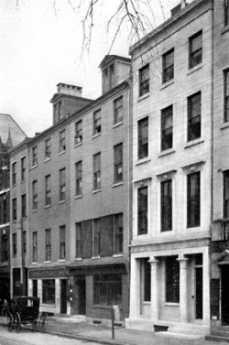
|
| Philadelphia Fire Insurance Company |
The Fair Plan (sixth and Chestnut, Philadelphia) is a fire insurance company with unusual features. Someday, it is to be hoped some scholar will write a book about the highly mixed motives of the people who created it, compared with the unexpected ways it did or did not fulfill original expectations, of both its creators and its enemies. The Fair Plan only issues fire insurance on houses, if other insurance companies have turned that house down as a bad risk. But if the clients pass that simple test, they get fire insurance at standard rates. Such risky houses would normally draw higher premiums for fire insurance, but the Fair Plan ensures these risky houses at normal rates. Therefore, it loses money, which is made up by the other regular fire insurance companies in the state in proportion to the business they do, obviously thus raising the price of fire insurance for everybody. But in this way, Pennsylvania guarantees that everybody can get fire insurance at standard rates. Is this a good idea? Might this be a way to give health insurance to all those people who can't get health insurance? Let's talk about the Fair Plan.
We'll set aside discussion of whether the Fair Plan was a product of cynical politicians pandering for votes, or whether it was a noble gesture for fairness and equality for our poorer citizens. It very likely had elements of both motives in it, but that doesn't matter anymore. It's a form of hidden taxation, of course, and it has the result of making Fire Insurance seem more expensive in Pennsylvania than in other places that do their social work with real taxes. Go too far with that, and people will end up buying their insurance in Bermuda instead of boarded-up former fire insurance companies in Pennsylvania.
As the story is now told, the regular insurance companies had a choice of taking the "substandard" applicants in turn ("Assigned Risk") or creating a new company (Joint Underwriting Association). They decided they preferred the JUA. So a company was formed which specializes in nothing but bad risks, including a few arsonists and other unmentionables, but mostly poor people in bad neighborhoods. If we are ever thinking about following the Fair Plan model in health insurance, it would run the risk of being accused of creating a two-class healthcare system. But no one seems to bring up that rhetoric about fire insurance, primarily because there is a comparatively little intrusion of politics in the matter, and anyway they provide standard fire insurance at standard premium rates. This system is given orders to spread the extra cost of universal fire insurance out to the policyholders of all fire insurance, and it does it very efficiently, without extending its mandate into setting firefighter wages, running fire departments or repainting scorched woodwork. The fundamental decision was whether to spend Society's money this way. Once that decision is taken, the task is to do it efficiently. Notice, this is not compulsory fire insurance; it is compulsory availability of fire insurance.
After the Fair Plan had been running for ten or so years, a funny thing emerged. There were years when the Fair Plan made a profit! The fire insurance industry had absorbed the Fair Plan into their scheme of things and felt free to increase the number of applicants they rejected, during years when money was tight or business was bad. If you had compulsory availability of fire insurance, the provision of a company which could not refuse an application made it possible for every other company to refuse when it pleased. When the economy encouraged rejection, a better class of applicant came to the Fair Plan, which made the plan more profitable. When economic conditions reversed, this reversed, and the Fair Plan again lost money. For this reason, the insurance industry is very anxious to prevent the Fair Plan from becoming political or getting tangled up in worthy but extraneous ventures. And that's probably a good model, too, if we are considering adopting a similar system for the health insurance world: stick to your mission.
Since this simple, tested idea never seems to get into the discussion phase of present agonizing over health insurance for the uninsured, it's one clear sign that such discussions at present are not terribly serious.
<Three decades ago, before a lot of New Jersey voters were even born, the so-called Abbott decision ordered the state to distribute money to woefully underperforming school districts to give the kids a fair chance in life. But now, thirty years later, the money routinely goes to ten or twelve school districts, and the other five hundred are suffering from high taxes. The voters in the five hundred districts are angry and want some of their tax money to stay at home. But by any fair appraisal, the schools in the Abbott Districts are still deplorable, and a great many children are growing up without an educational chance in modern life. Both sides have a legitimate point, and neither will budge.
But now there arises an entirely different way of looking at the mess. Maybe money isn't the point, but education is the point. The purpose of the Abbott District money was not to give money fairly or unfairly. The purpose of the money was to educate children, so at least they wouldn't grow up to a life of poverty and crime. In a sense, it doesn't much matter how unfairly the money is distributed, just so the kids get an education. Do they?
Frankly, it doesn't look as though they do. After thirty years, it is not hard-hearted to say the burden of proof is on those who say the money did some good. The very least that everyone ought to agree on is to perform a library search for other ideas, like charter schools, and report to a Legislative committee, followed by taking testimony from places with experience with other ideas. Because the real issue is not, how long we go on spending this money. It is, or ought to be, how long must the kids wait before something better is given a chance?
These are not easy issues. Our forebears didn't do such a wonderful job with assimilating the American Indians, but surely we can do better than that. With this horrible example before us, we cannot really expect the problem to solve itself. Nor is it a purely local problem; plenty of big cities have the same issue in a slightly different form. How are charter schools doing, for example? I have every confidence that if the local Camden County community, or even the whole State of New Jersey, could show some important progress -- money would come pouring in to help a winning project. But to keep on with the same old ideas is going to get you the same old results.
If there is a permanent moral to this vexed affair, here is the one that sticks to me. The Abbott decision seemed to be based on fundamental principles of fairness. But it could also have been described as an educational experiment, and all experiments contain a risk of failure. When courts make such an innovative decision, politics will soon lock it into place for many years longer than it takes to recognize it was a failed experiment -- if indeed it was a failure. Therefore, it is best for such experimental court decisions to set a time limit for later review and revision. Almost anyone would say this time period should be less than thirty years. Otherwise, such matters should be left to the Legislature, which is at least subject to frequent elections and can more easily devise modifications.
Fisher on Proposed Economic Zones

|
There's an idea that politicians are all negative characters, saying nasty things. That's probably because the public only listens to them during the last week of a campaign, when campaign advisors urge them that negative works best. So, here's a positive idea. And it comes from Camden County Republicans.
There's no doubt New Jersey is in a fiscal squeeze. Our property taxes are second-highest in the nation, but our municipal bonds are regarded as risky unless we raise taxes or cut spending. If we raise taxes, people will move to other states. In fact, we mainly haven't lost population because New York City is more heavily taxed, so New Yorkers move to New Jersey. Philadelphia has lost 40% of its population since the peak, and if you ask your neighbors, many of them moved from Philadelphia. Camden City just moved away, period. The people you don't talk to are the ones who have moved from New Jersey. So we are afraid to raise taxes, and we are a little afraid to cut them for fear the municipal bond market will strangle our borrowing power. Here's the proposal.
While we continue with Governor Christie's efforts to cut spending, like getting rid of those 800 paid Committees, and seeing if defined benefit pensions can be converted to defined contribution plans, and the like, let's cut taxes where it would help the most. The Camden County Republican proposal is to cut taxes in defined enterprise zones. If we can attract some new businesses into those zones, they and their employees would pay taxes, and the gamble might pay for itself. It might not, of course, but that's the risk any businessman takes when he makes an investment.
Right now, Exit 4 on the Turnpike is not in Legislative District 6, because the borders get shifted around by gerrymandering. But it's close, and most of the business activity it has created is within District 6, along the route toward Philadelphia. Most of the theory of business clusters suggests that a cluster of business activity is most sustainable when it contains a diversity of industries, but it needs a dominant industry to get started. Tom Booth suggests medical supplies already have a big start in our geographical area, and I can agree that eighty percent of the pharmaceutical industry is located within a hundred miles of us. Burlington County has demonstrated that you can keep everybody happy if you segregate commuters and farmers, which means helping the environmentalists and the businessmen at the same time. It really can be done and is being done by some of our neighbors. Not a bit of doubt you have to be careful about creating winners and losers, because that's where the graft comes from. But there's no doubt if you succeed, you will succeed big.
Cutting (some) taxes and helping the deficit at the same time. Just think of that. And think about 13% of unemployment in Camden County. We have to do something about that or it will destroy us.
Burlington Leads the Way
Somewhere in the past few decades, Burlington became quite activist. Although many tend to think of real estate planning as urban planning, this largely rural county went in for planning in a big way, deciding what it was and what it wanted to be. Generally speaking, its decision was to replace urban sprawl with cluster promotion. The farmers didn't like an invasion by McMansions or industries, while the towns lost their vigor through tax avoidance behavior of the commuter residents. Overall, the decision was to push urban development along the river in clusters surrounding the declining river towns, while pushing exurban development closer to logical commuting centers, leaving the open spaces to farmers. Incentives were preferred to compulsion, with a determination never to use eminent domain except for matters of public safety.
To implement these goals, two referenda were passed with 70% majorities to create special taxes for a development fund, which bought the development rights from the farmers and -- with political magic -- re-clustered them around the river towns. The farmers loved it, the environmentalists loved it, and the towns began to revive. The success of this effort rested on the realization that exurbanites and farmers didn't really want to live near each other, and only did so because developers were looking for cheap land. Many other rural counties near cities -- Chester and Bucks Counties in Pennsylvania, for example -- need to learn this lesson about how to stop local political warfare. Corporation executives don't want to live next to pig farms, but pig farmers are quite right that they were living there, first. When this friction seeps into the local school system, class warfare can get pretty ugly.

|
| Burlington Bristol Bridge |
In Burlington County, they thought big. The central project was to push through the legislature a billion-dollar project to restore the Riverline light rail to the river towns, along the tracks of the once pre-eminent Camden and Amboy Rail Road. It was an unexpected success. During the first six months of operation, ridership achieved a level twice as large as was projected as a ten-year goal. Along this strip of the Route 206 corridor, the old Roebling Steel Works are becoming the Roebling Superfund Site, now trying to attract industrial developers. The Haines Industrial Site originally envisioned as a food distribution center was sold to private developers who have created 5000 jobs in the area. Commerce Park beside the Burlington Bristol Bridge is coming along, as are the Shoppes of Riverton and Old York Village in Chesterfield Township. As Waste Management cleans up the site of the old Morrisville Steel plant across the Delaware River, a moderate-sized development project is becoming an interstate regional one.
No doubt there will be bumps in these roads; the decline of real estate prices nationally is a threat on the horizon, because it provokes a flight of mortgage credit. It works the other way, too, as banks decide to deleverage by reducing outstanding loans; this is the way downward spirals reinforce themselves. And anyone who knows anything about all state legislatures will be skeptical about political cooperation in a state as tumultuous as New Jersey. The Pennsylvania Railroad destroyed the promise of this state once; some other local interest could do it again. Nevertheless, right now Burlington County looks like a real winner, primarily because of effective leadership.
Harry Kaufman is now long gone, but for decades he represented the volunteer spirit of Haddonfield and the earnest, innocent happy way it contributed the essence of conflicted memories of its Revolutionary origins. The last time anyone counted, there were forty-two direct descendants of Elizabeth Haddon living in the borough, for example, and in a quiet determined manner, they keep alive the Quaker heritage of a non-Quaker town. For example, Harry made his living as a public relations officer for the milk industry. During World War II the Nicholson family who arrived here before William Penn still had a vast dairy farm with its own port on the Cooper River. It was located where Stoy's Landing Road crosses Grove Street, where there used to be something called the Race Track Circle, in honor of the Garden State Race Track which followed the dairy farm, and preceded the big-box shopping center which is still there, without the circle. New Jersey still has over two hundred traffic circles, and those who grew up here remember them as part of the New Jersey heritage, each one characteristically having a diner restaurant, also a Jersey invention and tradition.

|
| Plays and Players in Haddonfield, NJ |
Harry Kaufman may not have started the Plays and Players of Haddonfield, but he certainly sparked it to a near-professional level in a town of 7000 people. The orchestra and the ballet company are particularly outstanding at the moment, the soloists on the stage quite good, although they never made the grand European tour which is thought to be the prerequisite for getting into the big time. Harry was the life of any party, and particularly good at composing little ditties, never quite getting around to stringing them together into a musical comedy until the 250th anniversary of the town. Even then, it is recalled he was shy and reluctant and had to be pushed a little. Since The King's Road appeared shortly after Oklahoma! transformed, even revolutionized, American musical comedy, it was not only the model but the stimulus for a similar comedy celebrating the beginnings of our little state. The plot was a simple one of a conflicted love affair. The striking innovation of Oklahoma! was to crowd most of the show's songs into the first act, repeating snatches of their themes as sort of Wagnerian background commentary throughout the remainder of the play. The other innovation of what was originally called Green Grow the Lilacs was the addition of Agnes DeMille's ballet company to emphasize the real historical theme with light-hearted music. Since I was one of the original reviewers for Oklahoma! in its New Haven tryouts, I can remember the revolutionary impact of that play, very well.

|
| Anthony Wayne |
Harry had to go to the Historical Society for authentic details of the conflict between the attraction for Revolutionary aspirations for Liberty, and loyalty to the earlier sufferings of Quakers for their pacifist leanings. Some Quakers deserted their faith to join the Revolution, and other Quakers tried to convert the Hessian soldiers. And still, others were loyal to the King of England. The Revolution was almost won at this moment, as the British occupants of Philadelphia had abandoned their supplies to attack, and had to get to the British fleet, bottled up in the lower Delaware River by fortifications at Fort Mifflin and Fort Mercer on the Jersey side of the river. The Hessians had been sent to attack Fort Mercer from the rear, passing through Haddonfield and stopping one night before going on to what we now call National Park. While the Hessian officers were being entertained by John Gill with discussions of the futility of war, Jonas Cattell slipped out of town and ran to alert Fort Mercer of its danger. The guns of the Fort were turned around, and the defenders pretended not to notice the approach of the Hessians until they were ambushed and largely destroyed. If Fort Mifflin on the Pennsylvania side of the Delaware River could have held out, the starving British might have had to surrender, but that didn't happen. In any event, the New Jersey Militia did its part, and little Quaker Haddonfield helped them in a sort of characteristic Quaker way. With a ratta-tat-tat and a fiddly dee, the rag-tag swallow-tail Jersey Militia got all the credit.
The play does not emphasize that the State of New Jersey was founded at the Indian King Tavern during these commotions, or that General Washington starving at Valley Forge sent Mad Anthony Wayne to circle up and around Trenton to drive a herd of cattle back from Salem County, two hundred miles back to Valley Forge. The British sent Captain Simcoe down to Salem County to massacre the Quaker farmers who provided the cattle. These later developments are only mentioned in its anthem to "Generals Wayne, LaFayette, and Pulaski", and every good resident of Southern New Jersey is supposed to know what that is all about.
The Quaker historian Rufus Jones established the enduring tradition that this split is what ultimately reduced the Quakers from the dominant religious group to a small religious sect in the three states once owned by William Penn, Delaware, Pennsylvania, and New Jersey. Related to such turmoil was the claim that more battles of the Revolution were fought in New Jersey than in any other state; if you include the large privateer navy going to see from the Jersey Pine Barrens, that is probably true. And every twenty-five years or so, we have to put on a revival of "The King's Road", and just show 'em.
Some Tax Cuts are a Shell Game

|
| highest property tax |
New Jersey sometimes has the highest income tax in the nation, sometimes has the highest property tax, and sometimes both. Right now, they are both obscenely high. The proposal to "lower" property taxes by shifting them to income tax, is a sham.
In fact, it's already been done. Go to any one of the fifteen treasurers of the fifteen municipalities in the 6th Legislative District, and he will tell you -- the state budget already pays half of the expenses of the local towns, and it does so with money it gets from income taxes. Since I pay both taxes, I don't see how it lowers my tax costs at all.
And since the shell game has already been played once, it's entirely possible it can't be done a second time. The bond market will see the income taxes rising, go into a panic, and lower the New Jersey bond ratings. If we get to the point where we can't borrow any money from the bond market, we have really reached the end. There's really no alternative to cutting expenses, and for practical purposes, that means shifting state pensions from defined benefit to defined contribution. That's 401(k) we are talking about. Maybe we can save some money by putting a stop to double and triple-dipping the pensions from successive jobs, and putting a stop to escalating the last year before retirement with overtime work. Maybe the COLA doesn't have to be so rich. Maybe. But the big money is in the type of pension we pay.
Pretending we are doing something substantial by shifting property taxes to income taxes is only an election-year shell game.
Fisher on TV

|
| Governor Chris Christie |
As I was rushing out of my office tonight, trying not to be late for a gathering of constituents, I was suddenly confronted by a nice young lady holding a piece of paper, closely followed by a young man with a big professional TV camera. I like to think they were lying in wait for me, but more likely they were haunting the Starbucks across the street.
The question was fired at me, what did I think about Governor Christie using the Supreme Court about gay marriage? I had to admit I don't watch TV all day long, so I hadn't heard about it. Well, do you think it is appropriate for the Governor of a state to sue the Supreme Court? Huh, do you? Caught totally by surprise by a question I don't know much about, I answered, or mumbled, that it seemed to be a lawyer's question, and I'm not a lawyer. I do know that the U.S. Supreme Court will refuse to take a case unless the plaintiff can show he has sustained a personal loss of some sort. But I don't know anything about the New Jersey Supreme Court or its rules, and the whole thing seems to me to be above my pay grade. Or something like that.
If I had had more than ten seconds to think about it, I might have said, "What you really are asking me is Don't you think Christie is a bad, insensitive person?" And my answer to that question if put a little more plainly, would be, "No, I like Governor Christie a lot and I trust a former U.S. Attorney to know the fine points of law better than I do, so I support him."
And if I am wrong, and the real question you are asking me is Am I gay? Then, my answer would be, "No, I'm not gay one bit. But I am inclined to let other people do as they please, as long as it is harmless to others."
And if the hidden question is do I approve of people being gay, I would have to answer that if everybody became gay, it's pretty hard to see how the human race would survive. Now could I ask you a question? Who are you, and who is paying you to ask me slanted questions?
Follow-up, written the next day: The next day's newspaper gave an entirely new slant to this little episode. It seems the decision was made by the Superior Court, not the Supreme Court, and Governor Christie appealed the decision, he did not sue anybody. So the whole interview process was a put-up job, slanting the attention away from a record-breaking court decision to Governor Christie, who was dutifully responding to a Superior Court ruling which overturned a state law. All the rest of it was either intended to shift attention or else to tangle me up in a confused reaction to some events which did not happen at all.
In that case, let me state my central position. Governor Christie is a great guy, who definitely needs to win re-election November 5. And I am running for the role of Assemblyman for the 6th District, prepared to help him in every way I can.
CANDIDATE ABOUT HIMSELF

|
| Dr. George Fisher |
Dr. Fisher is running on a platform of supporting Governor Christie to fix our taxes and lending a voice on behalf of the patients caught in an Obamacare uproar that no one completely understands.
That is the platform of a Doctor and a taxpayer. I greatly admire what our Governor has done in the face of a hostile Legislature, but it doesn't go far enough, so I want to see what he can do with a more friendly Legislature. On the other side of it, thousands of people are going to be pushed into Medicaid, and Medicaid isn't ready for it. There aren't many doctors in the Legislature if there are any, and the patients need a voice for them in what promises to be a jumble.
There's really a lot more to say about this, and if the voters want to hear about it, I'll try to make it clear on this website.
Education and Career
Yes, I went to Yale, and then to Columbia University for medical school. I graduated from the eight-year course in six years. Eventually, I was to marry the girl who was first in the class -- my class. After that, seven years of graduate and specialty training, at Pennsylvania Hospital, Jefferson Hospital, and the National Institutes of Health. As I remember, the highest salary was $700 a month, and the first three years had no salary, just room and board.
There were very few Endocrinologists in those days, so I was on the staff of eleven hospitals in three states, and began a fifty-year career on the faculty of both the University of Pennsylvania and Thomas Jefferson University, while my wife became Professor of Radiology at Temple University.
My wife needed me at home when she got cancer, so I closed my office and did my best to help. In time, I found I was pretty poor at golf, so I started a book publishing company that now has 276 books in print. I wrote a book myself, called The Hospital that Ate Chicago , and six other books. My publishing specialty is medical economics. I got invited to the White House, and to address Congressional committees twice. John McClaughry of Vermont and I jointly produced an idea now called Health Savings Accounts.
When I saw what Governor Christie could accomplish with a hostile legislature, I asked what he could do if he had a friendly one, and signed up for this election. In the back of my mind was a concern that the patients are going to need a voice on their side when Obamacare pushes the uninsured by the thousands into Medicaid, which absolutely is not prepared for them. There are two seats available in the 6th District, and four of us are running. You folks get to choose.
Signers and Non-Signers of the Constitution
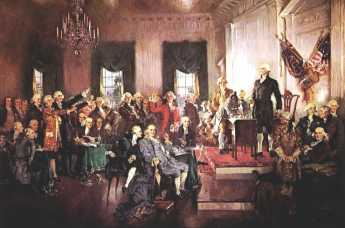
|
| Signers of The Constitution |
John Dickinson was active in designing both the Declaration of Independence and the Constitution, but he signed neither one. His position on the Declaration was that England had behaved in an offensive way; but the situation was getting better and it was still possible to patch things up, even with a British fleet in New York harbor displaying hostile intent. His later position on the Constitution is less clear. Dickinson asked George Read to sign his name because he was sick. Whether this was a real illness or a diplomatic illness is not readily known.
Three active delegates made no bones about their opposition to the final product: Edmond Randolph and George Mason of Virginia were not mollified by private assurances that a Bill of Rights was necessary but could be added later. They refused to sign a constitution that did not currently include this most passionate of their demands. There is little doubt of their sincerity, but any politician today would recognize they also needed to protect their flank from Patrick Henry who stayed at home denouncing the whole enterprise. Henry was a powerful speaker, representing the Scotch-Irish Virginia Piedmont area. In Scotland, Ireland, and America, that group had been abused by English kings three times and wanted iron-clad protection against backsliding to English rule or English government models. It's quite possible that Virginia's George Wythe and James McClurg left the convention early in order to avoid the local political consequences of signing the document, or the equally uncomfortable stance of opposing George Washington. The sentiments of Virginia can be surmised when of the seven delegates sent by Virginia, only John Blair joined the two instigators, George Washington and James Madison in announcing their approval. A majority of the Virginia delegation was thus held back on ratification until only one last vote was needed for enactment. Without George Washington, there can be little doubt the whole effort would have failed. Indeed, a case could be made that the location of the District of Columbia and the election of Virginians as four of the first five presidents also has the appearance of trying to persuade the six hundred pound Virginia gorilla to play nice.
Elbridge Gerry of Massachusetts similarly refused to sign any constitution which did not include a Bill of Rights. However, Gerry undermined his stance on principle by inventing the technique of packing his opposition into one voting district (by shifting its borders) so his own party could win narrow majorities in several other districts. This sleazy manipulation of loopholes in the system has become known as Gerrymandering and raises a question perhaps unfairly, of where Gerry actually stood on every other issue in the Constitutional Convention. By contrast, it is impossible to imagine George Washington doing such a thing, and quite possible to imagine he would never again speak to someone who did.
In addition to the three delegates who stayed to the end but refused to sign, an additional four left early to demonstrate their protest: John Lansing and Robert Yates of New York; and Luther Martin and John Mercer of Maryland.
We are left less clear about the opinions of seven more who simply left the convention early (Oliver Ellsworth of Connecticut, William Houston and William Pierce of Georgia, Caleb Strong of Massachusetts, William Houston of New Jersey, and William Davie and Alexander Martin of North Carolina.) The same uncertainty extends to the eighteen delegates who were invited to attend but either refused or regretted their inability to attend: (Erastus Wolcott of Connecticut, Nathaniel Pendleton and George Walton of Georgia, Charles Carroll, Gabriel Duvall, Robert Hanson Harrison, Thomas Sim Lee, and Thomas Stone of Maryland, Francis Dana of Massachusetts, John Pickering and Benjamin West of New Hampshire, Abraham Clark and John Neilson of New Jersey, Richard Caswell and Willie Jones of North Carolina, Henry Laurens of South Carolina, and Patrick Henry, Richard Henry Lee, and Thomas Nelson of Virginia). These men were originally selected because of their local eminence, so some of them may have been unable to spend several months in a City that took days to reach on horseback. On the other hand, we certainly know where Patrick Henry stood, and a large number of other abstentions from certain states suggests more than personal inconvenience was involved. After all, Rhode Island refused even to nominate anyone to the Delegation. In this last case, a political issue was highlighted. The Articles of Confederation which were being replaced not only required unanimous consent to change them, but they affirmed the Articles to be permanent. Under ordinary contract law, that would be dispositive. But George Washington was hell-bent on replacing the Articles of Confederation, so what they said would then no longer matter.
There remains a need for someone, perhaps in a doctoral thesis, to examine the voluminous correspondence and recollections of the large group of non-signers to assess the true nature of their failure to attend or sign. There was plenty of room for honest disagreement, personal business back at home, illness, or feelings of inadequacy. On the other hand, plenty of other subsequent politicians have exhibited an unwillingness to offend anyone, a hope to seek advantage from both sides, or a habitual tendency of waiting to see who would win before stating an opinion. Politics would be better without such personal inadequacies, but politics would not be politics without them. In fairness to their quandaries, the voting on the Constitution was by states, requiring nine to adopt it. If the vote of their state was a foregone conclusion, some delegates probably had a right to go home and let it happen in their absence. In the case of Alexander Hamilton, here stood the sole New York delegate in attendance at the final signing. Since he had been agitating for this sort of reform for seven years before Madison and Washington convinced each other, it seems possible that others withdrew to let him have the limelight. There is little doubt the single remaining responsibility of the signers was to go home and "deliver" their state for ratification, and Hamilton went at that with a vengeance. Although the moment of final signing appears on portraits and in sculpture, it was only the beginning of the battle for adoption, not the final victory. Indeed the Constitution as we now perceive it did not take more or less final form until the early government shaped its operation in actual practice. Most of that shaping process also took place in Philadelphia, during the first ten years while the seat of government was still located there. In particular, many if not most of the elected members of the First Congress had been members of the Constitutional Convention, returning to Philadelphia to finish the job by writing the Bill of Rights.
|
|
|
| |||||

|
||||||||
| Daniel Carroll |
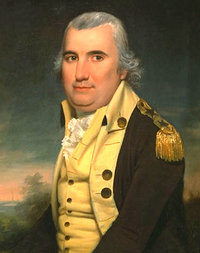
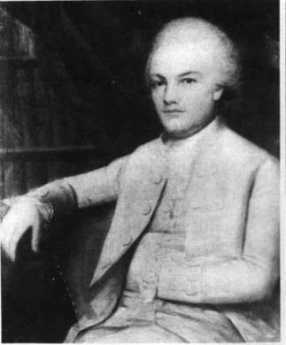
|
| Charles Pinckney |
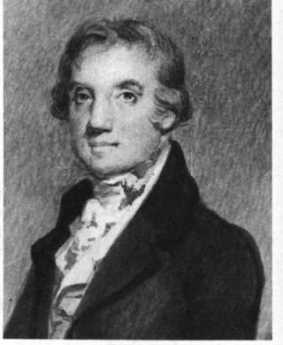
|
| Abraham Baldwin |
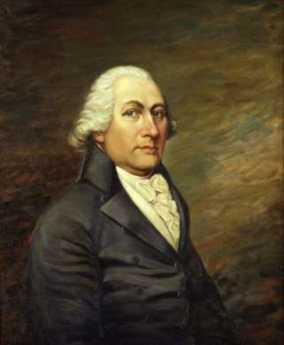
|
| John Langdon |

|
| Nicholas Gilman |
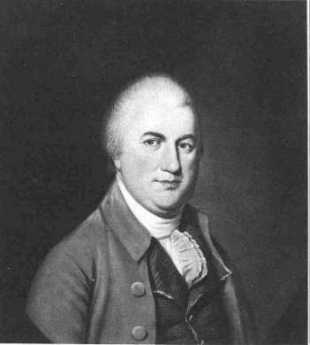
|
| Nathaniel Gorham |
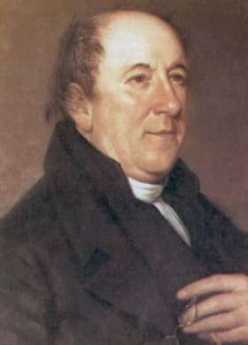
|
| Rufus King |

|
| Rodger Sherman |

|
| Alexander Hamilton |
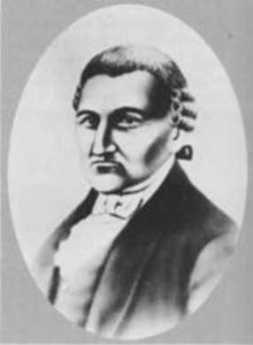
|
| David Brearly |
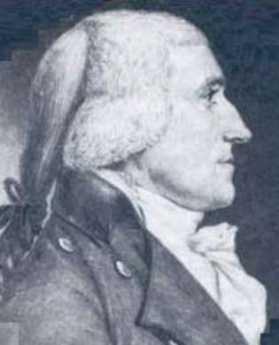
|
| Jonathan Dayton |
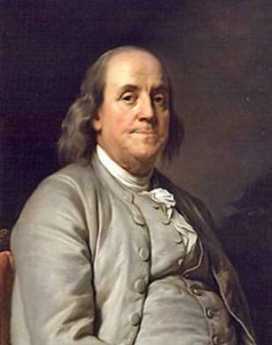
|
| Benjamin Franklin |
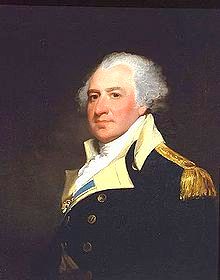
|
| Thomas Mifflin |
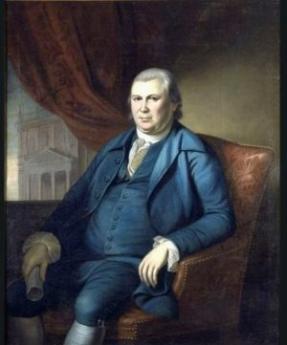
|
| Robert Morris |
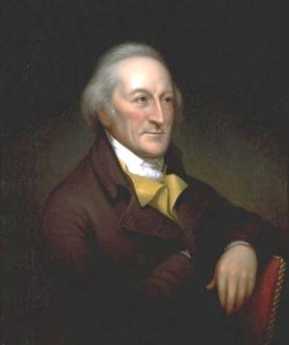
|
| George Clymer |

|
| Thomas Fitzsimons |
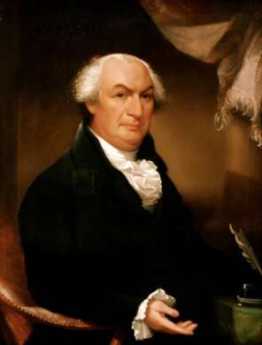
|
| Governor Morris |

|
| William Houston |
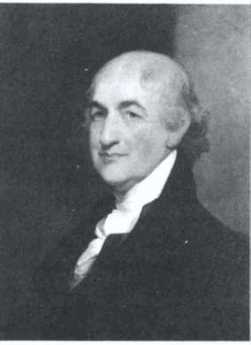
|
| Caleb Strong |

|
| William Davie |
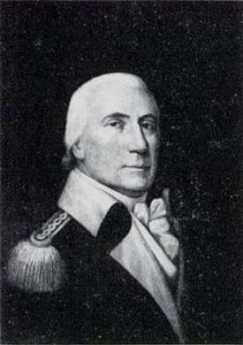
|
| Alexander Martin |
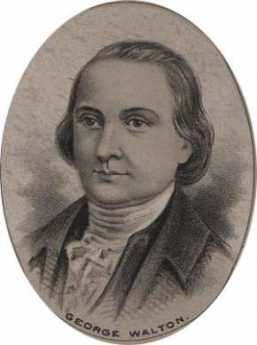
|
| George Walton |

|
| Charles Carroll |
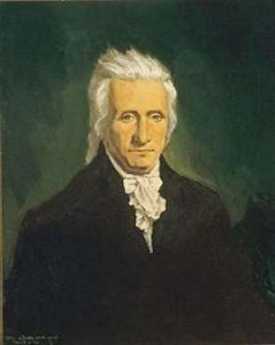
|
| Gabriel Duvall |
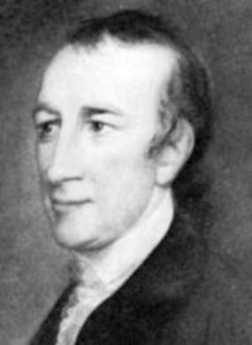
|
| Thomas Stone |
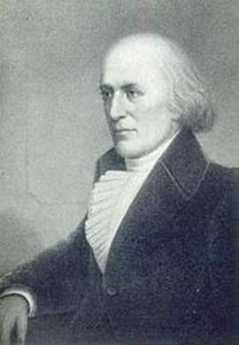
|
| Francis Dana |

|
| Benjamin West |
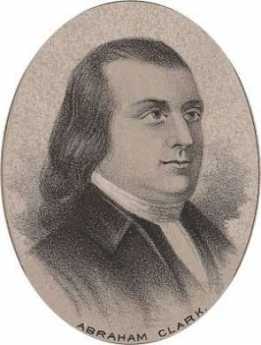
|
| Abraham Clark |
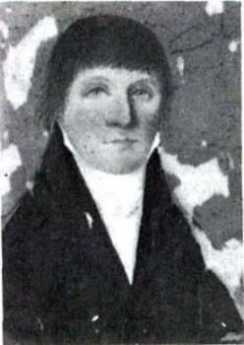
|
| Richard Caswell |

|
| Willie Jones |

|
| Henry Laurens |

|
| Patrick Henry |
.jpg)
|
| Thomas Nelson |
Yard Signs
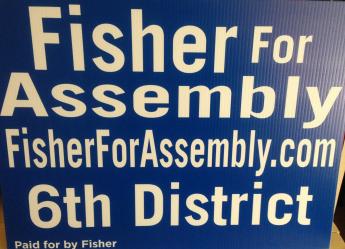
|
| Yard Signs |
For two weeks before election day, I had two "Fisher for Assembly" yard signs outside the entrance to my office, flapping back and forth in the wind. That's in the center of our little town, and the signs were stuck in the ground of what I assume is public property. If not, it is my rented property. One morning, I came to work and found they were gone. Perhaps it was Hallowe'en kids on a prank, perhaps the trash collectors swept them up. But the nice fellow with a beard who sits on a park bench next to the place, said, "No, it was some woman. She said it was against the law to put up signs in the business district, and he didn't argue with her. Nobody I asked had heard of any such law, so I have to assume she was an overzealous supporter of my opponents. In elections, this sort of partisanship has been known to get much worse than taking down an opponent's signs.
Anyway, my older daughter had been appointed campaign manager,, and she was very brisk about yard signs. Yes, indeed. Yard signs are very effective. How many do you have? The answer was five since at fifty dollars apiece, they seemed pretty pricey for what little good they did. No, no, they do a lot of good, so get fifty more immediately, and I'll help you place them. Well, that took a little pleading and arm-twisting, but the next day we had them. And, after church on Sunday (after Meeting on the First Day, as Quakers would say), we went off on a wild sign-placing ride. She drove, while I attached the wire stands to them. We were looking for signs that had been put up by other Republicans.
There are several reasons for putting your signs with those of your friends, in clusters. In the first place, this is one of the functions of a political party. There have been many previous elections, and the people who will give permission have long since been identified. The permission is only good for members of his party, however, since if you are an opponent you are likely to be confronted by ladies who say it is against the law. And the good places to put signs have long since been identified, usually at places where passing cars must slow down for a stop light. But how can anybody read your sign as they whiz by? They can't, which is why repetition is the thing. The same sign, with the same distinctive design, is finally read by someone who has seen it before but could only see the color pattern the first time. Putting a funny jingle on five successive signs was a very good idea once used extensively by Burma Shave. But it's expensive, and although everyone recognized a Burma Shave jingle, I have to admit that I never met anyone who actually used Burma Shave.
In the final outcome, I got 19,000 votes. Since I can scarcely imagine shaking 19,000 hands, that's pretty gratifying. Unfortunately, in this election, it would have been useful to have 750 more.
Election Night Celebrations
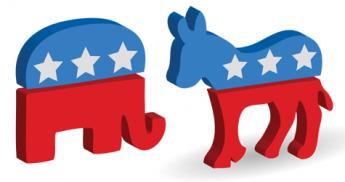
|
| Election Day |
The State of Delaware has its special election phenomenon of Returns Day, dating from Colonial days when people active in politics gathered in Georgetown waiting for the election returns to be counted and announced, and then celebrated. In a day when electronic balloting and vote counting have speeded things up, things have changed everywhere, but traces remain.
The tradition is now that the "head of the ticket", the Governor or Senator running for election will gather a large crowd in a hotel meeting room on the night of the election, about two hours after the polls close. Supporters are rewarded with drinks and eats, reporters gather for comments, and the television station interviews interminably, waiting for the results to be announced. Official results are slow to arrive, having to go through more certification steps, but the district and precinct leaders keep an open telephone line to headquarters, relaying the results, especially the local results, to the headquarter celebrations in various local hotels. At the local headquarters end of the lines, someone keeps an ear glued for ballot results to be announced. Nowadays, the party faithful is gathered in a taproom, all right, but the whole place is filled with people holding a cell phone to their ears while they eat pizza with the other hand. Nearby, of course, is a stein of beer. So, the room erupts with sudden huzzahs every few minutes, and at other times people are reassured that later returns will reverse an unfavorable trend. When the final results are announced, the losers make concession speeches. Winning politicians always arrive late to the party, are greeted with cheers, and proceed to make a victory speech. And then leave.
One by one, the ranks of the party thin out until the room is empty except for the barmaid.
Running for the Assembly, Only in Philadelpia
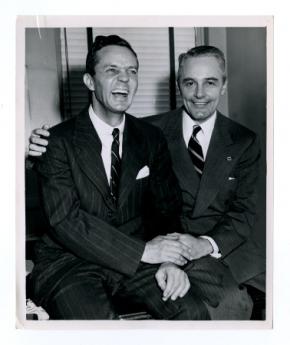
|
| Joseph Clark and Richardson Dilworth |
When I had to confess my defeat (by 5%) at a local club in Philadelphia that I belong to, I had to tell the group why I had been running for the Assembly. Finally, one friend with a puzzled look asked, "I never heard of running for election to the Assembly. I always thought membership was inherited."
Another friend had to tell him that it wasn't that Assembly, with dancing and all, it was the political one in New Jersey.
Only in Philadelphia, could you imagine such a conversation.
Minimum Wage Fangdoodle
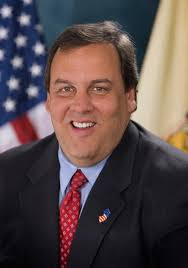
|
| Governor Chris Christie |
The November 2013 elections have been widely accepted to be a spectacular win for New Jersey Governor Chris Christie, suddenly making him a presidential front-runner for 2016. The only other significant election was a close win in the Virginia gubernatorial race for a fund-raising crony of Bill Clinton over the Attorney General who started the Supreme Court Case over Obamacare. In the view of the news media, there were only two elections in this off-year -- a landslide in New Jersey, and a dead heat in Virginia, for Governor.
Well, as a matter of fact, there was also an election in New Jersey for all of the members of the legislature, which means that I was running against the Democratic majority leader in the 6th Legislative District. I got 19,000 votes, but I needed more to win. At least in my family, it was a big event, particularly since no one else in New Jersey contributed a dime to my campaign, and while Governor Christie may have whispered a few encouraging words to me, there was no evidence of his assistance. But you can forget about that, too, because this election was really about the minimum wage.
The first inkling I got that something was up was receiving a sample ballot, three days before the election, where there was a referendum question about the minimum wage that no one had told me about, although it could scarcely have been a secret to get it on the ballot. And secondly, on election day there was scarcely any evidence of campaigning for Democrat candidates except for a few yard signs, but literally, dozens of campaign workers poured into the subway stations, handing out great volumes of campaign literature about the minimum wage. Even that went past me unnoticed, because who in the world would vote for a proposal which would increase unemployment during a severe recession? When I expressed the same sentiment to my Democratic friends, I was surprised to discover they all knew about it in advance. In retrospect, that was a fairly good indication that the Internet had selectively urged support of this proposition to the party faithful, but had not said one word in campaigning for it. It won endorsement by a heavy margin, as things soon turned out. What's worse, what had been endorsed by referendum had been to amend the constitution to this effect, automatically indexing it to the cost of living. It's going to be pretty hard to reverse that since all constitutions have been written to make it very hard to amend them.
p> In the week after the election, I notice that several other states have been considering raising the minimum wage. An article appeared on the editorial page of the New York Times arguing that research showed there was no evidence that raising the minimum wage caused unemployment, and a few days later, Paul Krugman had a learned column on the Times editorial page to the effect that smart people all knew there was no reason to expect unemployment from raising the minimum wage, and only the hopelessly ignorant rubes would imagine there was reason to think so. Having spent some time with editorial writers, it seemed pretty evident to me that there was a nationally coordinated effort to convert this into a truism, accepted so widely it would be futile to argue against it. When it is also possible to see the existence of a campaign to impose a maximum wage (and not merely in Switzerland, where it was defeated on a ballot), the trajectory of a rising minimum wage meeting a falling maximum wage easily led to conjectures that what was really afoot was a campaign to take wages out of the marketplace. Or was that really the goal?
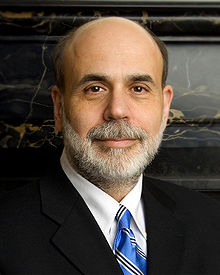
|
| Ben Bernanke |
For months, the Federal Reserve Chairman has been emphasizing that the Fed must obey two mandates: to maintain price stability and to minimize unemployment. Meanwhile, the dirty little secret among economists has been that unemployment is the main obstacle to inflation in the face of a massive enlargement of the money supply. Unemployment is currently at 7.1% and falling, while the Fed has lifted the veil of "transparency" to reveal it made a promise in double-speak to start selling some of the bonds it issued to combat the recession when unemployment reaches 6.5%. As time has gone on, Mr. Bernanke has seemed to back away from that promise. He is not so sure that unemployment is a good measure of unemployment, other measures may be a better measure of what we are driving at. He never meant to start selling bonds when unemployment reached 6.5%, he only meant that he might reduce the number he planned to buy. He never meant to make a promise, he only was being transparent about the current thinking of the Board. And anyway, Janet Yellen will take over his job in a month, so you can't very well bind your successor to do anything at all. What's this tap-dancing all about?
Well, it simply won't do, to suggest that the Federal Reserve isn't as independent of politics as it pretends to be. But everyone noticed that the stock market had a bad fainting spell when he suggested a few months ago that the Board had been discussing the matter; just imagine what it would do if he actually made a promise to act, let alone actually taking an action. By itself, such an announcement would probably send interest rates on a rise toward normal levels. The stock market mostly anticipates the future, so it would jump ahead of whatever action was taken. Since the United States is now the largest debtor on earth, a rise of interest rates would immediately add huge amounts to the current deficit and the projected national debt. The stock market would almost surely drop, possibly severely, in response to such commotion in the debt markets. And the national economy would certainly feel the deflationary effect of such activity in the financial markets, sending markets even lower. Fear of such a reaction would surely persist longer than the real need for monetary easing, making the resultant inflation even worse than it had to be.
 Is it possible the Obama Administration prefers a little extra unemployment, to risking a stock market crash before a coming election? 
|
| Minimum Wage Uproar |
In an era of desperate experimentation with the simultaneous solutions of several problems at once, perhaps the best conservative response to this paper is to seek ways to relax its inflexibility. The political process, particularly the amendment of state constitutions, is a lengthy and cumbersome impediment to agile management of the economy. It is fairly unlikely that a secret springing of a referendum trap can be repeated. The greater risk is that we will know what should be done, but become unable to do it quickly.
Meanwhile, the politicians are designing things and politicians like things simple. The Republican solution is to pass a minimum wage, but keep its benefit slightly below the entry-level wage; they get credit for passing it, but it has almost no applicability. The Democrat approach is to make a big noise about passing a meaningless bill, promising they will make it up with off the balance sheet entitlements, like health care and college tuition. Either way, usually nothing much happens after the election is over.
26 Blogs
Fisher on Issue Politics
 A politician wants to know what his constituents think, and the constituents often want to know what their representative thinks. But the airwaves seem to be dominated by professionals, hired to persuade the representative how to vote.
A politician wants to know what his constituents think, and the constituents often want to know what their representative thinks. But the airwaves seem to be dominated by professionals, hired to persuade the representative how to vote.
Fisher -- Stump Speech
 What in the world should a candidate for state Assembly have for a campaign speech? Here's the first try at it.
What in the world should a candidate for state Assembly have for a campaign speech? Here's the first try at it.
Fisher on Political Clubs
 I was very pleasantly surprised to see the number, the vigor and the youth who enthusiastically attend local Republican clubs, at least in New Jersey.
I was very pleasantly surprised to see the number, the vigor and the youth who enthusiastically attend local Republican clubs, at least in New Jersey.
Fisher's Platform
 My job is to help Governor Christie lower state taxes and to supply some helpful background in sorting out whatever Obamacare portends for the state.
My job is to help Governor Christie lower state taxes and to supply some helpful background in sorting out whatever Obamacare portends for the state.
Fisher on Representation Size
 My Legislative district had 224,000 residents, according to the census. If I spent five minutes talking to each one, I wouldn't have time to sleep or eat.
My Legislative district had 224,000 residents, according to the census. If I spent five minutes talking to each one, I wouldn't have time to sleep or eat.
Fisher on Meeting With the Enemy
 Some of the nicest people say the darnedest things.
Some of the nicest people say the darnedest things.
The Absent Booker
 Mr. Booker is running for the Senate, but spending his time in California.
Mr. Booker is running for the Senate, but spending his time in California.
How They Do It in Delaware
 The nation's smallest state conducts a lot of things the way they did in the Eighteenth Century.
The nation's smallest state conducts a lot of things the way they did in the Eighteenth Century.
Georgetown Returns Day
 Glimpse what American democracy was supposed to be in the little Delaware village of Georgetown, even after nearly three centuries have gone by. Two days after the election, the victorious and the defeated candidates still appear for announced election results, ride around the courthouse in a carriage together, and actually bury a hatchet.
Glimpse what American democracy was supposed to be in the little Delaware village of Georgetown, even after nearly three centuries have gone by. Two days after the election, the victorious and the defeated candidates still appear for announced election results, ride around the courthouse in a carriage together, and actually bury a hatchet.
Fisher on Stuffing Ballot Boxes
 I hear, but scarcely can believe, that there is occasional voter fraud.
I hear, but scarcely can believe, that there is occasional voter fraud.
Fisher on the Coming Physician Shortage
 Two Republican ladies are running for Assembly in the 11th District. They say we are going to get a physician shortage, and I agree with them. I am running in the 6th Legislative district. (The 6th Congressional district is something else.)
Two Republican ladies are running for Assembly in the 11th District. They say we are going to get a physician shortage, and I agree with them. I am running in the 6th Legislative district. (The 6th Congressional district is something else.)
Fisher on Proposed Economic Zones
 If you can't lower taxes across the board, perhaps you can lower them for specific purposes that stimulate the economy.
If you can't lower taxes across the board, perhaps you can lower them for specific purposes that stimulate the economy.
Burlington Leads the Way
Even the most rural counties can wake up and become activists. Because the leaders were Quakers, they did it without making people mad.
Fisher on an Assembly Provision
 Some things can only be changed by changing a law.
Some things can only be changed by changing a law.
Barnes Foundation -- Drawing a New Moral
 Inflation makes for a new slant on the saga of the Barnes Foundation.
Inflation makes for a new slant on the saga of the Barnes Foundation.
A Healthcare Reform Obamacare Forgot
 Universities are the beneficiaries, and medical costs are elevated, by astronomical medical student tuitions.
Universities are the beneficiaries, and medical costs are elevated, by astronomical medical student tuitions.
Fisher on the Environment
 Social issues are very important to the people affected by them, and some of them have to be considered right now. But generally speaking, the issues which the New Jersey Assembly can do anything about, are economic ones during a recession. These have been neglected for far too long, and that neglect is catching up with us.
Social issues are very important to the people affected by them, and some of them have to be considered right now. But generally speaking, the issues which the New Jersey Assembly can do anything about, are economic ones during a recession. These have been neglected for far too long, and that neglect is catching up with us.
CANDIDATE MAIN PAGE
This blog is the main feature of the candidate webpage
Some Tax Cuts are a Shell Game
 Reducing property taxes by shifting them to income tax, is a shell game.
Reducing property taxes by shifting them to income tax, is a shell game.
Fisher on TV
 They stop you on the street with a movie camera, these days.
They stop you on the street with a movie camera, these days.
CANDIDATE ABOUT HIMSELF
Use this blog to describe yourself, your policies, whatever you want to do
Signers and Non-Signers of the Constitution
 Seventy delegates were invited to attend the Constitutional Convention, fifty-five attended the sessions, but only thirty-nine signed it. Considering that Rhode Island refused to send delegates, that sounds like a closer vote than it really was. But it was definitely not unanimous.
Seventy delegates were invited to attend the Constitutional Convention, fifty-five attended the sessions, but only thirty-nine signed it. Considering that Rhode Island refused to send delegates, that sounds like a closer vote than it really was. But it was definitely not unanimous.
Yard Signs
 It is hard to know whether yard signs do any good, but they are part of the election ceremony.
It is hard to know whether yard signs do any good, but they are part of the election ceremony.
Election Night Celebrations
 The tradition of an election night party, complete with concession speeches followed by victory speeches, slowly evolves.
The tradition of an election night party, complete with concession speeches followed by victory speeches, slowly evolves.
Running for the Assembly, Only in Philadelpia
 Except for Clarke and Dillworth, Philadelphia social leaders haven't had much to do with politics for a century.
Except for Clarke and Dillworth, Philadelphia social leaders haven't had much to do with politics for a century.
Minimum Wage Fangdoodle
 While no one was looking, mandating a minimum wage turned into a contrivance to maintain low-interest rates.
While no one was looking, mandating a minimum wage turned into a contrivance to maintain low-interest rates.

